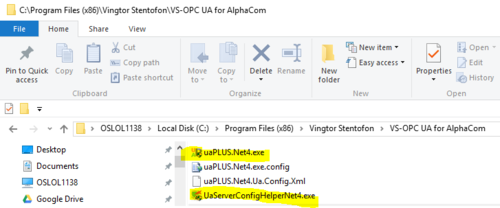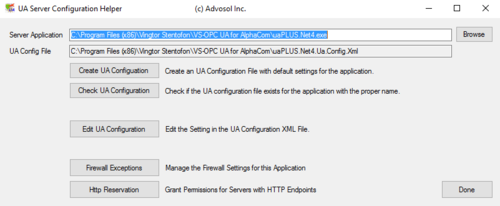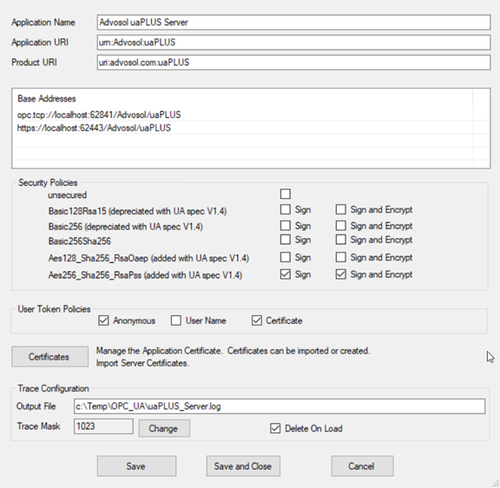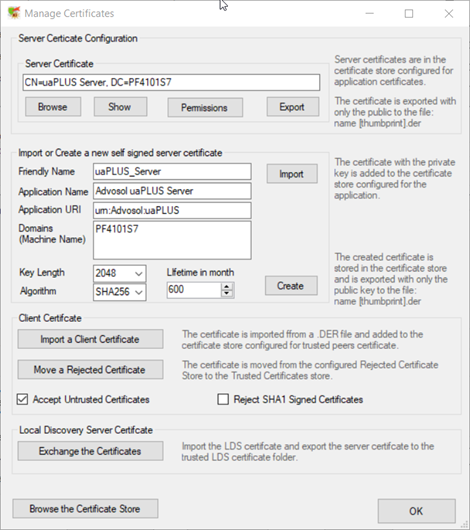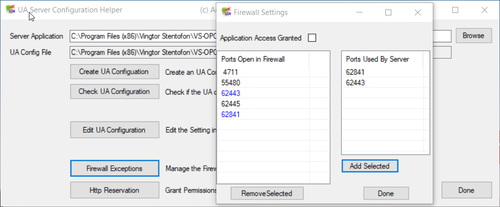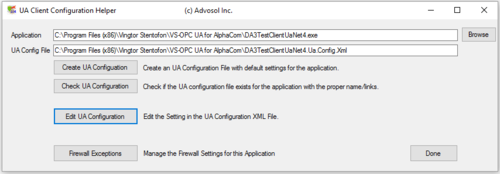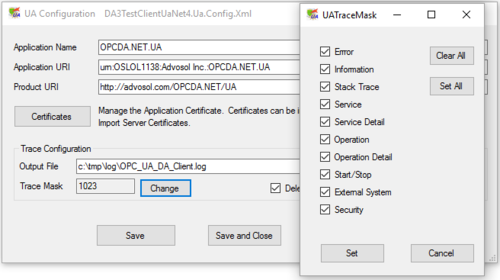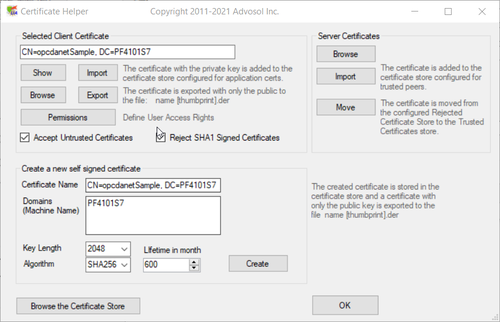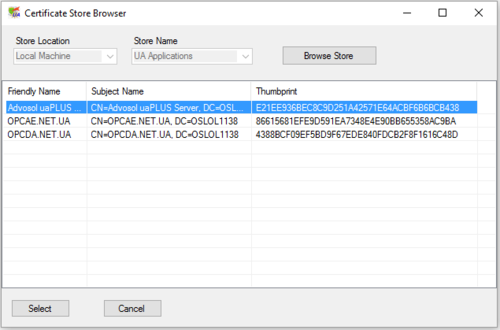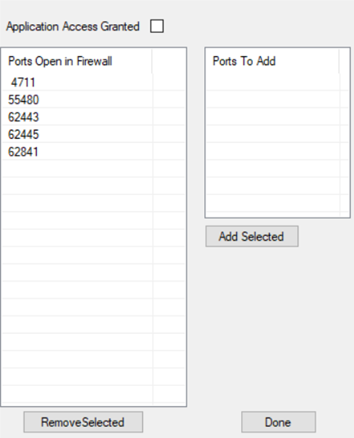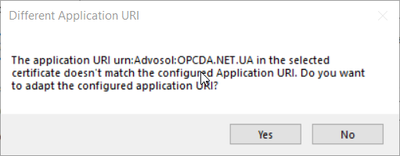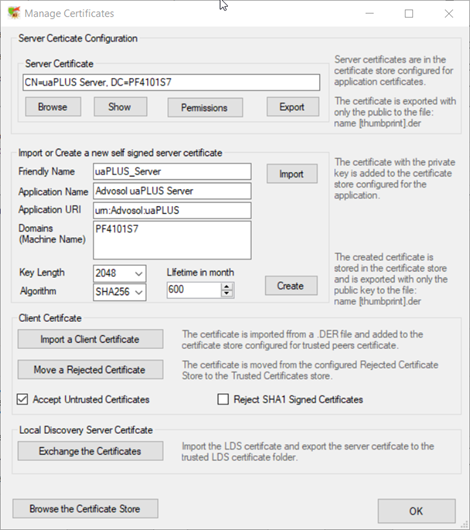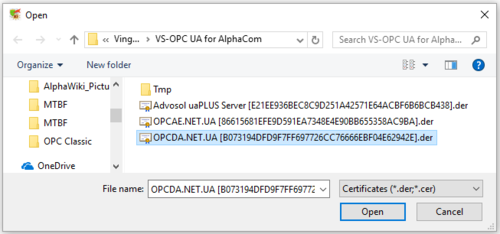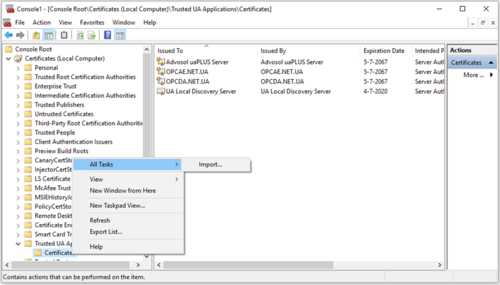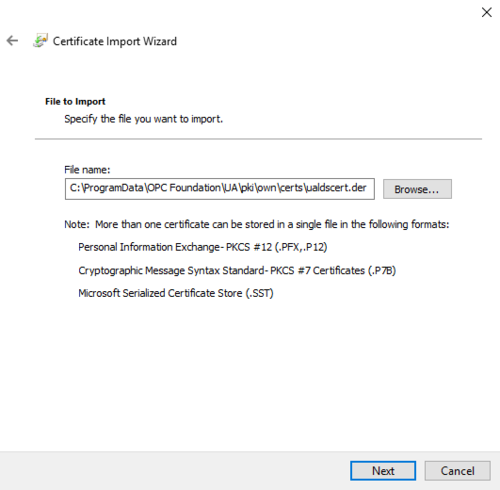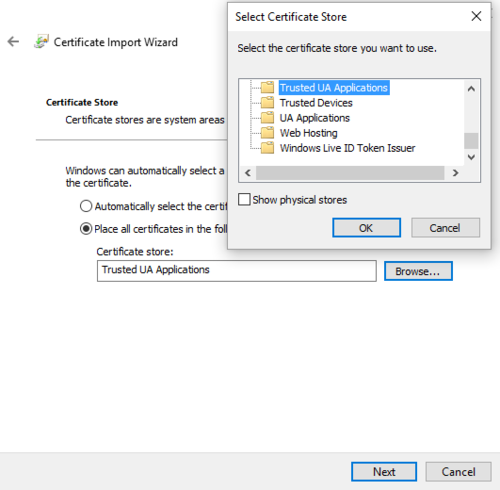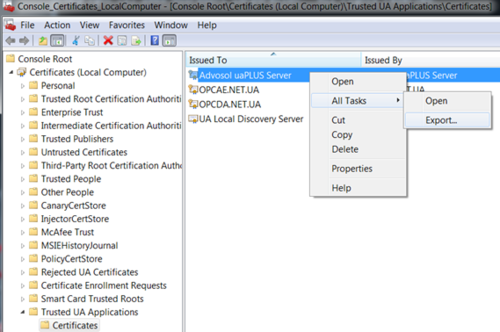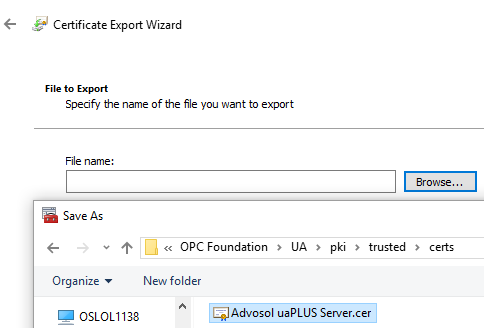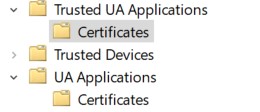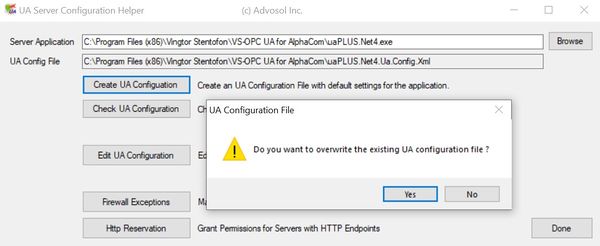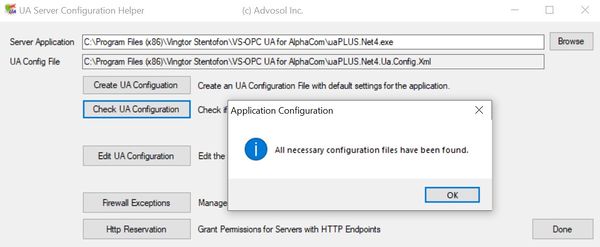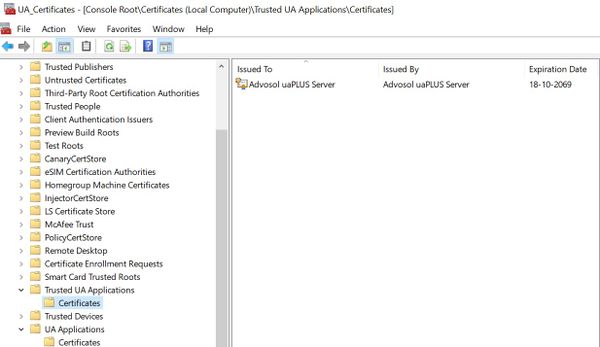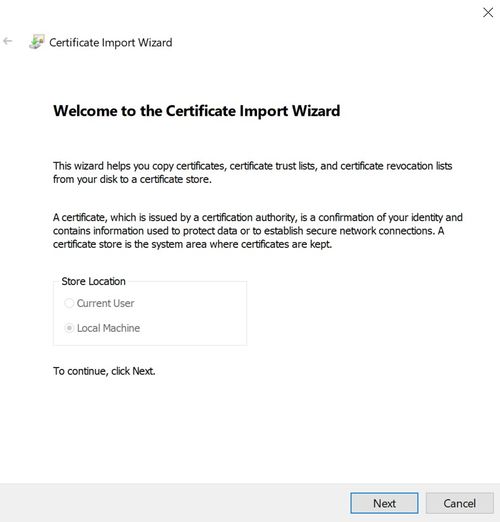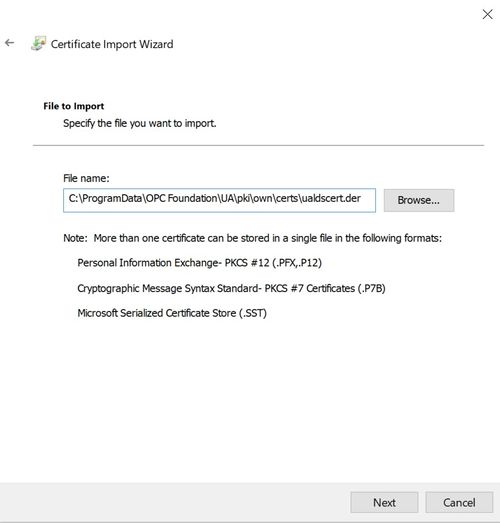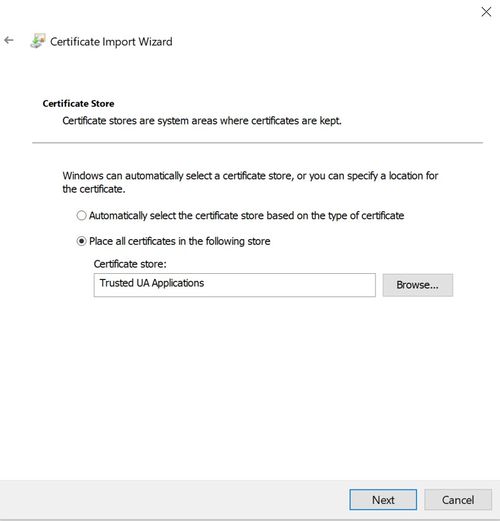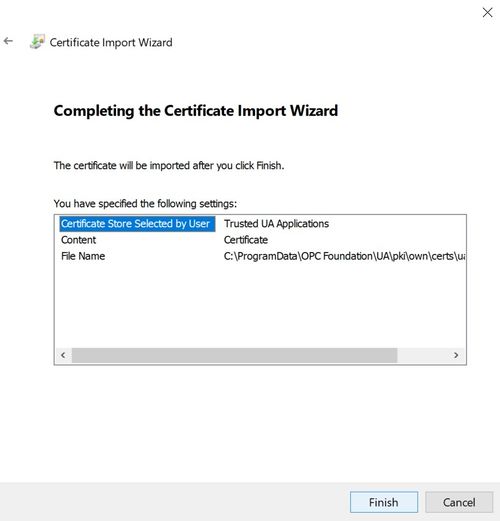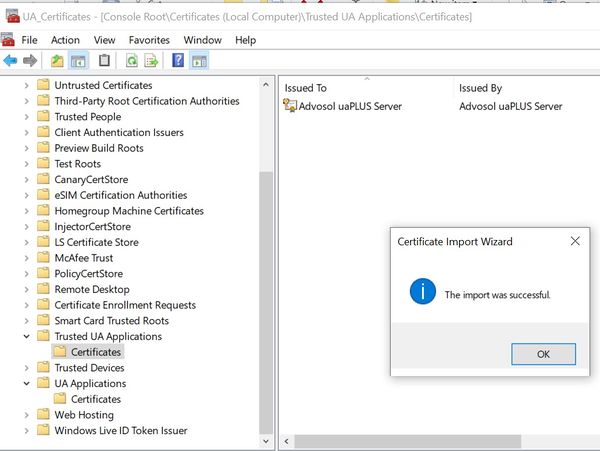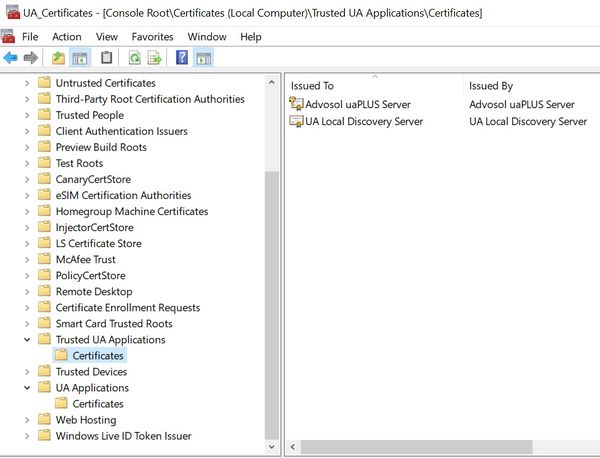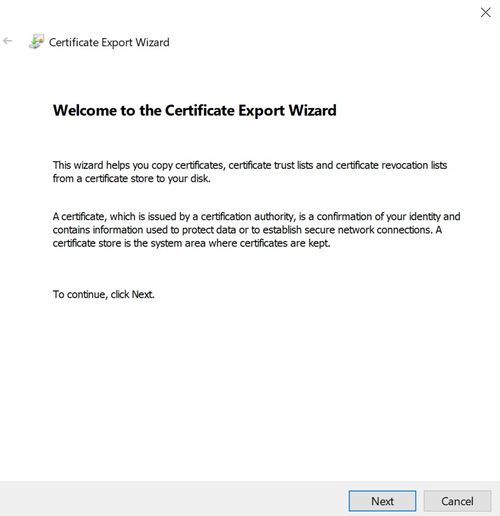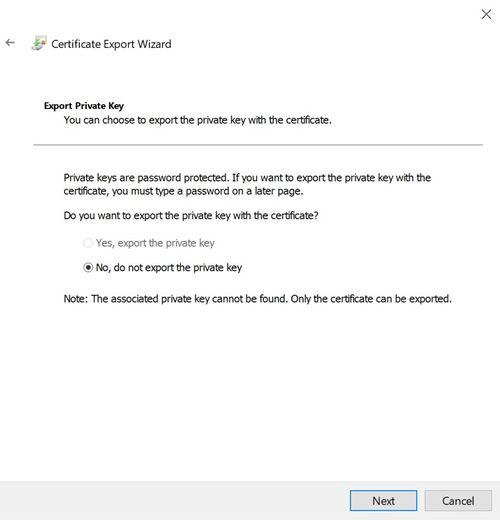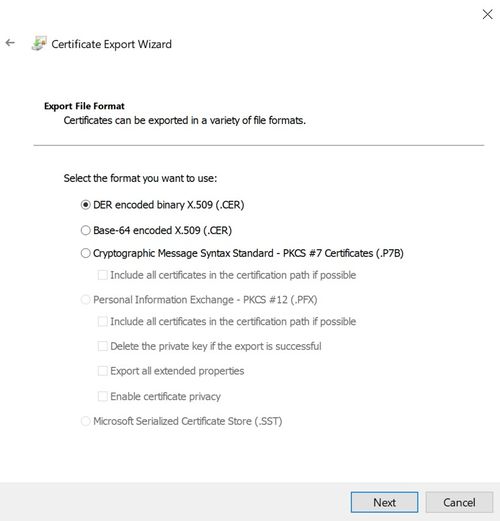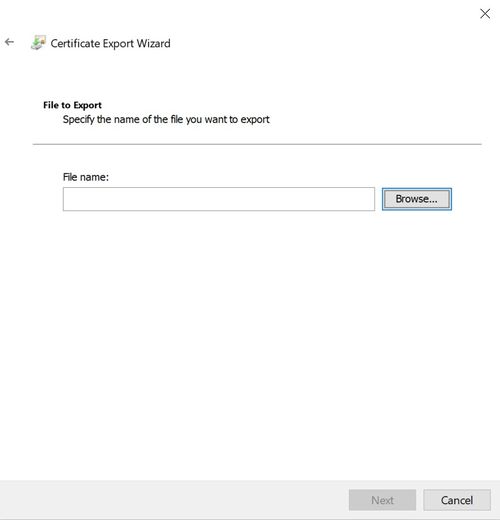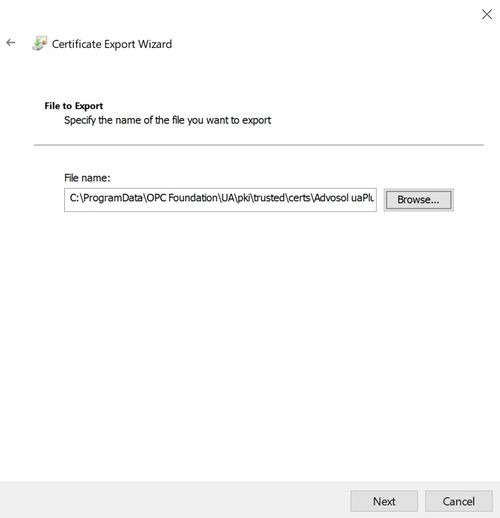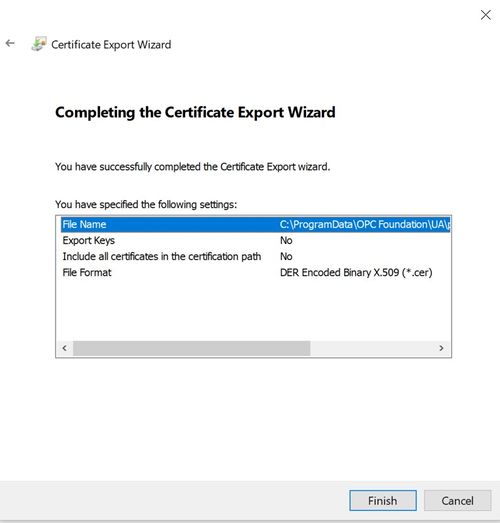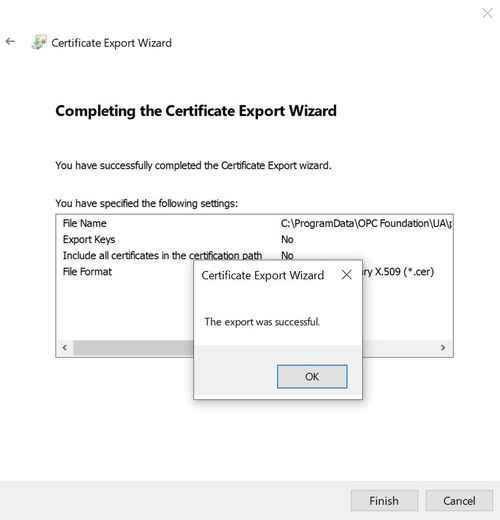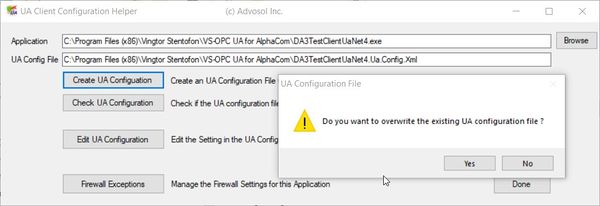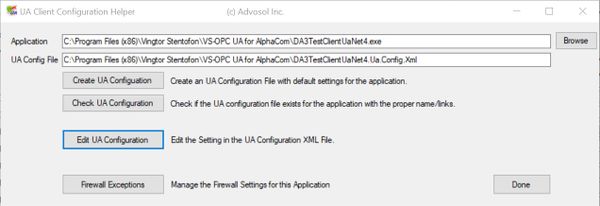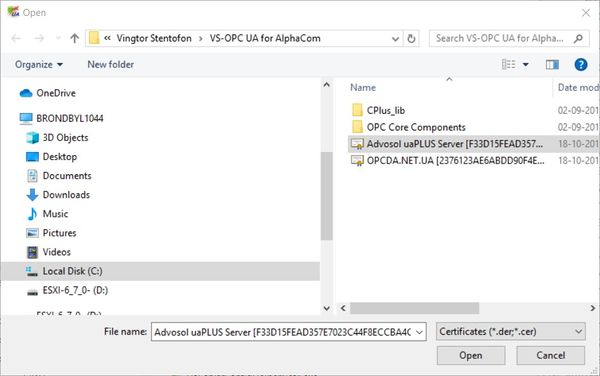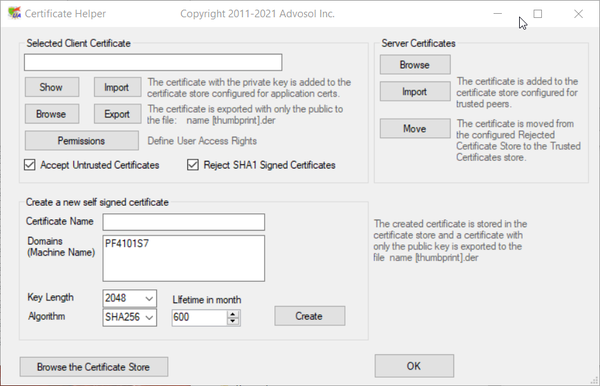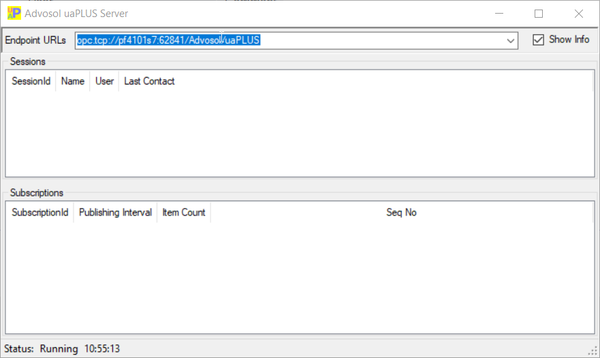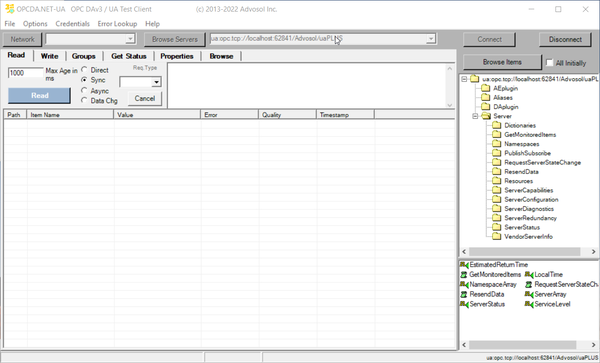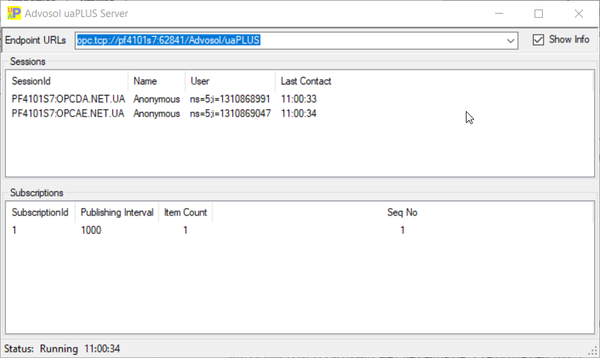Difference between revisions of "OPC UA for AlphaCom - Installation"
From Zenitel Wiki
m (→Software installation) |
EMortensen (talk | contribs) m (→Installing the service) |
||
| (66 intermediate revisions by 3 users not shown) | |||
| Line 1: | Line 1: | ||
| − | {{ | + | {{AI}} |
==Introduction== | ==Introduction== | ||
This document is an installation manual describing how to install the Vingtor-Stentofon OPC UA Server and all required additional software components. | This document is an installation manual describing how to install the Vingtor-Stentofon OPC UA Server and all required additional software components. | ||
| + | |||
The Vingtor-Stentofon OPC UA Server makes it possible to control and monitor the Alphacom using the OPC UA protocol. | The Vingtor-Stentofon OPC UA Server makes it possible to control and monitor the Alphacom using the OPC UA protocol. | ||
| Line 14: | Line 15: | ||
==OPC UA clients== | ==OPC UA clients== | ||
This article describes the setup of the OPC UA server and the test clients that come with it. OPC UA clients from other suppliers may have different methods of installing and certificate handling than described in this article for the test clients. Please follow the instructions as supplied with these OPC UA clients. The process normally involves: | This article describes the setup of the OPC UA server and the test clients that come with it. OPC UA clients from other suppliers may have different methods of installing and certificate handling than described in this article for the test clients. Please follow the instructions as supplied with these OPC UA clients. The process normally involves: | ||
| + | |||
| + | *Creating a certificate for the server | ||
*Making the OPC UA Client trust the OPC UA Server by importing the server certificate | *Making the OPC UA Client trust the OPC UA Server by importing the server certificate | ||
*Creating a certificate for the client | *Creating a certificate for the client | ||
*Making the OPC UA Server trust the OPC UA Client by importing the client certificate | *Making the OPC UA Server trust the OPC UA Client by importing the client certificate | ||
| + | *Making the OPC UA Discovery Server and the OPC UA Server trust each other | ||
==Prerequisites== | ==Prerequisites== | ||
| − | Vingtor-Stentofon OPC UA Server is based on .NET version 4. | + | Vingtor-Stentofon OPC UA Server is based on .NET version 4.8. This package can be freely downloaded from Microsoft. |
==Software package contents== | ==Software package contents== | ||
| Line 34: | Line 38: | ||
*Install_AlphaCom_OPC.bat | *Install_AlphaCom_OPC.bat | ||
| − | == | + | ==Installation== |
| + | |||
| + | ===Install the VS-OPC UA package=== | ||
Double-click on the msi-installation package and follow the instructions: | Double-click on the msi-installation package and follow the instructions: | ||
*VS-OPC UA for AlphaCom_Setup_vx.x.x.x.msi (x.x.x.x is the version number, always check the AlphaWiki download page for the latest version) | *VS-OPC UA for AlphaCom_Setup_vx.x.x.x.msi (x.x.x.x is the version number, always check the AlphaWiki download page for the latest version) | ||
| − | + | ===Set Administrator Privilages for all executables=== | |
By default, the software is installed in the following directory: '''C:\Program Files (x86)\Vingtor Stentofon\VS-OPC UA for AlphaCom''' | By default, the software is installed in the following directory: '''C:\Program Files (x86)\Vingtor Stentofon\VS-OPC UA for AlphaCom''' | ||
| + | |||
Ensure that '''ALL''' executables in this directory run in '''Administrator Mode'''. | Ensure that '''ALL''' executables in this directory run in '''Administrator Mode'''. | ||
| − | |||
| − | Install the | + | *Right click on each executable and select 'Properties->Compatibility' |
| + | *Set check mark in 'Run this program as an administrator' | ||
| + | |||
| + | ===Install the OPC Core Components=== | ||
| + | By default the installation package is located in the directory: '''C:\Program Files (x86)\Vingtor Stentofon\VS-OPC UA for AlphaCom\OPC Core Components''' | ||
| + | |||
For 64-bit operating systems it is necessary to install both ('''x86 and x64''') packages | For 64-bit operating systems it is necessary to install both ('''x86 and x64''') packages | ||
| − | ==UA Local Discovery Server== | + | ===Install the UA Local Discovery Server=== |
The Local Discovery Server (LDS) provides the necessary infrastructure to publicly expose the OPC UA Servers available on a given computer. | The Local Discovery Server (LDS) provides the necessary infrastructure to publicly expose the OPC UA Servers available on a given computer. | ||
The LDS is included in the installation package. The latest release can be downloaded from the following link: | The LDS is included in the installation package. The latest release can be downloaded from the following link: | ||
| Line 65: | Line 76: | ||
*Startup Type: Automatic | *Startup Type: Automatic | ||
| − | + | In case these settings are not made, right click on the entry in the services dialog and select Properties. Make the appropriate selections under the TAB '''General''' and click OK. | |
==UA Security== | ==UA Security== | ||
===Introduction=== | ===Introduction=== | ||
| − | The UA security is based on X509 Certificates. | + | The UA security is based on X509 Certificates. Each UA server and client application requires a certificate with the Application URI of the application. |
| − | Each UA server and client application requires a certificate with the Application URI of the application. | ||
| − | |||
| − | |||
| − | |||
| − | |||
| − | |||
| − | |||
| − | *On the server machine create a certificate for the server. UaClientConfigHelper automatically exports created certificates into a .DER file in the utility directory. | + | *Self-signed certificates can be created with the '''uaPLUS UaServerConfigHelper''' utility. |
| − | *Copy the client certificate .DER file to the server machine and import it with the UaServerConfigHelper utility. | + | *uaPLUS maintains certificates in the Windows Certificates Store. |
| − | *Copy the server .DER certificate file to the client machine and import it. The location depends on the client application. For Advosol UA client applications the UaClientConfigHelper utility imports the certificate to the proper location. | + | *The certificates are by default in the stores LocalMachine\UA Applications and LocalMachine\Trusted UA Applications |
| + | *The stores are defined in the application UA configuration and can be changed if necessary. | ||
| + | *The UaServerConfigHelper utility creates and imports certificates into the stores defined in the configuration. | ||
| + | *With the server and client on the same machine the certificates are in the right place when created or imported with the Advosol UaServerConfigHelper and UaClientConfigHelper utilities. | ||
| + | *With server and client on different machine the following steps are required: | ||
| + | **On the server machine create a certificate for the server. UaClientConfigHelper automatically exports created certificates into a .DER file in the utility directory. | ||
| + | **Copy the client certificate .DER file to the server machine and import it with the UaServerConfigHelper utility. | ||
| + | **Copy the server .DER certificate file to the client machine and import it. The location depends on the client application. For Advosol UA client applications the UaClientConfigHelper utility imports the certificate to the proper location. | ||
| − | uaPLUS stores untrusted certificates it receives from connecting clients in the store defined in the UA configuration settings for rejected certificates (default: LocalMachine\Rejected UA Certificates). Instead of importing the client certificate before the client connects, the rejected certificate can be copied after a failed connect. The UaServerConfigHelper utility has an option (MOVE button) to copy the certificate. | + | *uaPLUS stores untrusted certificates it receives from connecting clients in the store defined in the UA configuration settings for rejected certificates (default: LocalMachine\Rejected UA Certificates). Instead of importing the client certificate before the client connects, the rejected certificate can be copied after a failed connect. The UaServerConfigHelper utility has an option (MOVE button) to copy the certificate. |
| − | Note: The certificates must be configured for the Windows store type. | + | *Note: The certificates must be configured for the Windows store type. |
| + | *The Windows Certificates manager can be used to check and maintain the certificates beyond the capabilities of the UaServerConfigHelper utility. | ||
| − | The | + | ===Creating a Certificate for uaPLUS Server=== |
| + | The UaServerConfigHelper utility is provided with the uaPLUS server toolkit. | ||
| − | + | *This utility should be used to edit the UA server configuration file whenever possible. | |
| − | + | *The UaServerConfigHelper also supports the import, export and creation of the necessary certificates. | |
| − | This utility should be used to edit the UA server configuration file whenever possible. | + | *Certificates need to be created with this tool to meet all UA requirements. |
| − | The UaServerConfigHelper also supports the import, export and creation of the necessary certificates. | + | *The Edit UA Configuration dialog edits the UA configuration XML file for the selected application. |
| − | Certificates need to be created with this tool to meet all UA requirements. | + | *The uaPLUS.Net4.exe is the generic part of the OPC UA server. |
| − | The Edit UA Configuration dialog edits the UA configuration XML file for the selected application. | ||
| − | + | Creating a certificate for the server is carried out in the way described below. | |
| − | Drag the uaPLUS.Net4.exe over the UaServerConfigHelperNet4.exe. | + | '''Drag''' the '''uaPLUS.Net4.exe''' over the '''UaServerConfigHelperNet4.exe''' as shown below. |
[[File:UaServerConfigHelperNet4.PNG|thumb|left|500px|Drag and drop uaPLUS.Net4.exe onto UaServerConfigHelperNet4.exe]] | [[File:UaServerConfigHelperNet4.PNG|thumb|left|500px|Drag and drop uaPLUS.Net4.exe onto UaServerConfigHelperNet4.exe]] | ||
| + | <br style="clear:both;" />This loads the following window. | ||
| + | [[File:UA_Server_Configuration_Helper.PNG|thumb|left|500px|UA Server Configuration Helper main screen]] | ||
| + | |||
| + | *<br style="clear:both;" /> | ||
| + | *Press the '''Create UA Configuration''' button and accept any changes<br> | ||
| + | |||
| + | Press the '''Edit UA Configuration''' to load the following window. | ||
| + | <br> | ||
| + | [[File:UA_Configuration_V02.PNG|thumb|left|500px|UA Configuration]] | ||
<br style="clear:both;" /> | <br style="clear:both;" /> | ||
| + | *Set the '''Security Policies''' and '''User Token Policies''' flags as shown in the screenshot. | ||
| + | *Set the '''Trace Configuration''' Output File directory to '''C:\Tmp\Log\''' | ||
| + | *Set the '''Trace Mask''' can be changed by clicking the '''Change''' button followed by the '''Set All''' button and accept with the '''Set''' button. Enabling all options will set the trace mask to the value 1023 as shown above. | ||
| + | *Click '''Save''' to save the changes. | ||
| + | |||
| + | Click on '''Certificates''' to load the following window | ||
| + | <br> | ||
| + | [[File:Manage_Certificates_V02.PNG|thumb|left|500px|Manage Certificates]] | ||
| + | |||
| + | *<br style="clear:both;" /> | ||
| + | *Click '''Create''' to create a certificate. | ||
| + | *Click '''OK''' | ||
| + | It is possible to make the OPC-UA Server and the Local Discovery Server trust each other by pushing the button "Exchange the Certificates" in the "Local Discovery Server Certificate" group tile. This can also be setup as described in sections "Make OPC UA Server trust LDS" and "Make LDS trust OPC UA Server". | ||
| + | <br> | ||
| + | <br> | ||
| + | Now back in the UA Configuration window, click '''Save and Close''' | ||
| + | <br>Now back in the Configuration Helper, click on '''Firewall Exceptions''' to load the following window | ||
| + | [[File:Port62841_and_62443.PNG|thumb|left|500px|Port 62841 and 62443Open in Firewall]] | ||
| − | + | *<br style="clear:both;" /> | |
| − | <br style="clear:both;" /> | + | *Make certain that port 62841 and 62443 are in the column '''Ports Open in Firewall'''. |
| − | + | **If not, select '''62841/62443''' from the column '''Ports Used By Server''' and press '''Add Selected''' | |
| − | + | **Click '''Done''' | |
| − | |||
| − | |||
| − | + | Now back in the Configuration Helper, click '''Done''' | |
| − | |||
| − | |||
| − | |||
| − | |||
| − | |||
| − | |||
| − | |||
| − | |||
| − | |||
| − | |||
| − | |||
| − | |||
| − | |||
| − | |||
===Creating a certificate for clients=== | ===Creating a certificate for clients=== | ||
| − | + | This section describes how to create certificates for the test clients. | |
| − | + | ||
| − | The UaClientConfigHelper utility is provided with the uaPLUS server toolkit. | + | *In 'real' installations, it will also be required to create certificates for the clients which are installed on the specific site. |
| − | This utility is only needed for the configuration of the provided test client applications, mainly the management of the needed certificates | + | *The procedure to create those certificates may differ, please consult the with the clients provided documentation. |
| − | + | *The UaClientConfigHelper utility is provided with the uaPLUS server toolkit. | |
| + | *This utility is only needed for the configuration of the provided test client applications, mainly the management of the needed certificates. | ||
===Creating a Certificate for DA3TestClientUaNet4=== | ===Creating a Certificate for DA3TestClientUaNet4=== | ||
To create a certificate for the UA-DA test client drag the DA3TestClientUaNet4.exe over UaClientConfigHelperNet4.exe | To create a certificate for the UA-DA test client drag the DA3TestClientUaNet4.exe over UaClientConfigHelperNet4.exe | ||
[[File:UaClientConfigHelperNet4_DAClient.PNG|thumb|left|500px|Drag and drop DA3TestClientUaNet4.exe onto UaClientConfigHelperNet4.exe]] | [[File:UaClientConfigHelperNet4_DAClient.PNG|thumb|left|500px|Drag and drop DA3TestClientUaNet4.exe onto UaClientConfigHelperNet4.exe]] | ||
| − | <br style="clear:both;" /> | + | <br style="clear:both;" />This will load the Client Configuration Helper as shown below. |
[[File:UA_DAClient_Configuration_Helper.PNG|thumb|left|500px|UA DA Client Configuration Helper main screen]] | [[File:UA_DAClient_Configuration_Helper.PNG|thumb|left|500px|UA DA Client Configuration Helper main screen]] | ||
| − | <br style="clear:both;" /> | + | <br style="clear:both;" />Press the '''Create UA Configuration''' button to overwrite the existing file. |
| − | Press the '''Create UA Configuration''' | + | |
| − | Press the '''Edit UA Configuration''' | + | <br>Press the '''Edit UA Configuration''' button to load the following window |
[[File:UA-DA client config.PNG|thumb|left|500px|UA DA Client Configuration]] | [[File:UA-DA client config.PNG|thumb|left|500px|UA DA Client Configuration]] | ||
<br style="clear:both;" /> | <br style="clear:both;" /> | ||
| − | + | *Set the '''Trace Configuration''' Output File to '''C:\Tmp\Log\OPC_UA_DA_Client.log''' | |
| − | ''' | + | *Set the '''Trace Mask''' can be changed by clicking the '''Change''' button followed by the '''Set All''' button and accept with the '''Set''' button. |
| − | + | *Click '''Save''' to save the changes. | |
| − | + | ||
| − | [[File:Create UA-DA Client | + | <br>Click on the '''Certificates''' button to load the below window. |
| − | <br style="clear:both;" /> | + | [[File:Create UA-DA Client certificate_V02.PNG|thumb|left|500px|Create UA-DA Client Certificate]] |
| − | Click '''Create''' | + | <br style="clear:both;" />Click the '''Create''' button to create the Client Certificate |
| − | + | ||
| − | <br style="clear:both;" /> | + | <br style="clear:both;" />In the '''Server Certificates''' group box, click '''Browse''' and select the server certificate. |
| − | In the '''Server Certificates''' group box, click '''Browse''' and select the server certificate. | ||
[[File:UA-DA Client certificate store.PNG|thumb|left|500px|Add server certificate to the UA-DA Client store]] | [[File:UA-DA Client certificate store.PNG|thumb|left|500px|Add server certificate to the UA-DA Client store]] | ||
| − | <br style="clear:both;" /> | + | <br style="clear:both;" />Select the Advosol uaPLUS certification and click '''Select'''<br> |
| − | + | Back in the Certificate Helper, click '''OK''' | |
| − | + | ||
| − | + | <br>Back in the UA Configuration, click '''Save and Close''' | |
| − | + | ||
| − | [[File:UA Firewall | + | <br>Back in the Client Configuration Helper, click '''Firewall Exceptions'''<br> |
| − | <br style="clear:both;" /> | + | [[File:UA Firewall exceptions_V02.PNG|thumb|left|500px|Port 62841]] |
| − | + | <br style="clear:both;" />Ensure that that port 62841 is open in the firewall and click Done<br><br>Back in the Client Configuration Helper, click '''Done'''<br> | |
| − | |||
| − | |||
| + | <br> | ||
===Creating a Certificate for AE-UATestClientNet4=== | ===Creating a Certificate for AE-UATestClientNet4=== | ||
To create a certificate for the AE test client drag the AE-UATestClientNet4.exe over UaClientConfigHelperNet4.exe | To create a certificate for the AE test client drag the AE-UATestClientNet4.exe over UaClientConfigHelperNet4.exe | ||
[[File:UaClientConfigHelperNet4_AEClient.PNG|thumb|left|500px|Drag and drop AE-UATestClientNet4.exe onto UaClientConfigHelperNet4.exe]] | [[File:UaClientConfigHelperNet4_AEClient.PNG|thumb|left|500px|Drag and drop AE-UATestClientNet4.exe onto UaClientConfigHelperNet4.exe]] | ||
| + | <br style="clear:both;" />Follow the directions for the DA Test Client above and exchange "DA" with "AE". | ||
| + | <br> | ||
| + | In case this pops | ||
| + | <br> | ||
| + | [[File:DifferentApplicationURI.PNG|thumb|left|400px|Different Application URI]] | ||
<br style="clear:both;" /> | <br style="clear:both;" /> | ||
| − | + | just push "Yes".<br> | |
| − | + | <br> | |
| − | |||
| − | |||
| − | |||
| − | |||
| − | |||
| − | |||
| − | |||
| − | |||
| − | |||
| − | |||
| − | |||
| − | |||
| − | |||
| − | |||
| − | |||
| − | |||
| − | |||
| − | |||
| − | |||
| − | |||
| − | |||
| − | |||
| − | |||
| − | |||
| − | |||
| − | |||
===Make Clients Trusted Applications for the Server=== | ===Make Clients Trusted Applications for the Server=== | ||
Drag the uaPLUS.Net4.exe over the UaServerConfigHelperNet4.exe | Drag the uaPLUS.Net4.exe over the UaServerConfigHelperNet4.exe | ||
[[File:UaServerConfigHelperNet4.PNG|thumb|left|500px|Drag and drop uaPLUS.Net4.exe onto UaServerConfigHelperNet4.exe]] | [[File:UaServerConfigHelperNet4.PNG|thumb|left|500px|Drag and drop uaPLUS.Net4.exe onto UaServerConfigHelperNet4.exe]] | ||
| − | <br style="clear:both;" /> | + | <br style="clear:both;" />This loads the Server Configuration Helper |
| − | |||
[[File:UA_Server_Configuration_Helper.PNG|thumb|left|500px|UA Server Configuration Helper main screen]] | [[File:UA_Server_Configuration_Helper.PNG|thumb|left|500px|UA Server Configuration Helper main screen]] | ||
| + | <br style="clear:both;" />Press the '''Edit UA Configuration''' to load the UA Configuration window. | ||
| + | [[File:UA_Configuration_V02.PNG|thumb|left|500px|UA Configuration]] | ||
<br style="clear:both;" /> | <br style="clear:both;" /> | ||
| − | Click '''Certificates''' | + | Click '''Certificates''' to open the Manage Certificates window |
| − | [[File: | + | [[File:Manage_Certificates_V02.png|thumb|left|500px|Import a Client Certificate]] |
| − | <br style="clear:both;" /> | + | <br style="clear:both;" />Click '''Import a Client Certificate''' to load the certificate list |
| − | Click '''Import a Client Certificate''' | ||
| − | |||
| − | |||
| − | |||
[[File:Import DA and AE certificates.PNG|thumb|left|500px|Import the OPC-UA DA and OPC-UA AE Client Certificates]] | [[File:Import DA and AE certificates.PNG|thumb|left|500px|Import the OPC-UA DA and OPC-UA AE Client Certificates]] | ||
| − | <br style="clear:both;" /> | + | <br style="clear:both;" />Select first the OPC UA DA Client certificate and subsequently the OPC UA AE client certificate and press '''Open''' |
| − | + | ||
| − | + | Back in the Manage Certificates window, click '''OK''' | |
| − | + | Back in the UA Configuration window, click '''Save and Close''' | |
| + | Back in the Configuration Helper window, click '''Done'''<br> | ||
| + | <br> | ||
===Make OPC UA Server trust LDS=== | ===Make OPC UA Server trust LDS=== | ||
| − | The LDS certificate is stored in this location '''C:\ProgramData\OPC Foundation\UA\pki\own\certs\ualdscert.der'''. | + | <br> |
| − | Open a Command Prompt as administrator | + | In case the OPC-UA Server and the Local Discovery Server are already configured to trust each other from the OPC UA Server configuration - the following two sections sections should be carried out. |
| − | Type '''mmc''' and press the '''ENTER'''-key | + | <br> |
| − | On the '''File''' menu, click '''Add/Remove Snap In''' | + | The LDS certificate is stored in this location '''C:\ProgramData\OPC Foundation\UA\pki\own\certs\ualdscert.der'''. |
| − | In the Available snap-ins box, select '''Certificates''' | + | *Open a Command Prompt as administrator |
| − | Click '''Add''' | + | *Type '''mmc''' and press the '''ENTER'''-key |
| − | In the Certificates snap-in dialog box, select '''Computer account''' | + | *On the '''File''' menu, click '''Add/Remove Snap In''' |
| − | Click '''Next''' | + | *In the Available snap-ins box, select '''Certificates''' |
| − | Note: If you are not an administrator of the computer, you can manage certificates only for your user account. Select '''My User account''' or '''Service account''' in the step above instead. | + | *Click '''Add''' |
| − | In the Select Computer dialog box, click '''Finish''' | + | *In the Certificates snap-in dialog box, select '''Computer account''' |
| − | In the Add/Remove Snap-in dialog box, click '''OK'''<br> | + | *Click '''Next''' |
| − | In the Console Root window, click '''Certificates (Local Computer)''' to view the certificate stores for the computer. | + | *Note: If you are not an administrator of the computer, you can manage certificates only for your user account. Select '''My User account''' or '''Service account''' in the step above instead. |
| + | *In the Select Computer dialog box, click '''Finish''' | ||
| + | *In the Add/Remove Snap-in dialog box, click '''OK''' | ||
| + | |||
| + | <br>In the Console Root window, click '''Certificates (Local Computer)''' to view the certificate stores for the computer. | ||
[[File:Console Certificates import.PNG|thumb|left|500px|Import LDS certificate into the store]] | [[File:Console Certificates import.PNG|thumb|left|500px|Import LDS certificate into the store]] | ||
| − | <br style="clear:both;" /> | + | |
| − | Navigate to '''Certificates/Trusted UA Applications/Certificates''' | + | *<br style="clear:both;" /> |
| − | Right click on '''Certifcates''' and select '''All Tasks/Import ...''' | + | *Navigate to '''Certificates/Trusted UA Applications/Certificates''' |
| − | The 'Certificate Import Wizard' will open. On the Welcome screen, click '''Next''' | + | *Right click on '''Certifcates''' and select '''All Tasks/Import ...''' |
| − | + | *The 'Certificate Import Wizard' will open. On the Welcome screen, click '''Next''' to load the below window<br> | |
| + | |||
[[File:ualdscert_import.PNG|thumb|left|500px|Certificate import]] | [[File:ualdscert_import.PNG|thumb|left|500px|Certificate import]] | ||
| − | <br style="clear:both;" /> | + | |
| − | + | *<br style="clear:both;" /> | |
| + | *Browse to where the certificate is located ('''C:\ProgramData\OPC Foundation\UA\pki\own\certs''') and open. Note that you need to set the file type to All Files. | ||
| + | *Click Next to open the Select Certificate Store window<br> | ||
| + | |||
[[File:placecertificate.PNG|thumb|left|500px|Select certificate store]] | [[File:placecertificate.PNG|thumb|left|500px|Select certificate store]] | ||
| − | <br style="clear:both;" /> | + | <br style="clear:both;" />Set the Certificate Store to '''Trusted UA Applications''' if required and click '''Next''' |
| + | |||
As the last step click '''Finish''' - the certificate will now be imported<br> | As the last step click '''Finish''' - the certificate will now be imported<br> | ||
===Make LDS trust OPC UA Server=== | ===Make LDS trust OPC UA Server=== | ||
| − | + | From the certificate store, Right-click on '''Advosol uaPLUS Server''' and select '''All tasks > Export...''' | |
| − | |||
| − | |||
| − | |||
| − | |||
| − | |||
| − | |||
| − | |||
| − | |||
| − | |||
| − | |||
| − | |||
| − | Right-click on '''Advosol uaPLUS Server''' and select '''All tasks > Export...''' | ||
[[File:Export OPC UA certificate.PNG|thumb|left|500px|Export OPC UA Server certificate]] | [[File:Export OPC UA certificate.PNG|thumb|left|500px|Export OPC UA Server certificate]] | ||
<br style="clear:both;" /> | <br style="clear:both;" /> | ||
| − | The '''Certificate Export Wizard''' will open, click on '''Next''' | + | |
| − | Select '''No, do not export the private key''' and click '''Next''' | + | *The '''Certificate Export Wizard''' will open, click on '''Next''' |
| − | Select '''DER encoded binary X.509 (.CER)''' and click '''Next'''<br> | + | *Select '''No, do not export the private key''' and click '''Next''' |
| − | + | *Select '''DER encoded binary X.509 (.CER)''' and click '''Next''' to load the export window | |
| + | |||
| + | <br /> | ||
[[File:Select OPC UA server certificate.PNG|thumb|left|500px|Select OPC UA server certificate]] | [[File:Select OPC UA server certificate.PNG|thumb|left|500px|Select OPC UA server certificate]] | ||
| + | |||
| + | *<br style="clear:both;" /> | ||
| + | *Browse to '''C:\ProgramData\OPC Foundation\UA\pki\trusted\certs'''; | ||
| + | *Enter the name of the certificate: '''Advosol uaPLUS Server.cer'''; | ||
| + | *click '''Save''', | ||
| + | *click '''Next''' | ||
| + | |||
| + | As the last step click '''Finish''' - the certificate will now be exported | ||
| + | |||
| + | ==OPC Client and Server running on the same machine== | ||
| + | Skip forward to [[OPC UA for AlphaCom - Installation#Startup%20of%20Server%20.2F%20Client%20Connection|Startup of Server and Client Connection]] | ||
| + | |||
| + | ==OPC Client and Server running on separate Machines== | ||
| + | The following section describes how to setup a system where the clients and server are running on separate machines. The following configuration is used: | ||
| + | <br /> | ||
| + | [[File:OPC_UA_Setup_1.jpg|frameless|500px]] | ||
| + | |||
| + | The main steps of installing certificates for an OPC system, where the client and server are running on separate machines comprises of the following steps: | ||
| + | |||
| + | 1) '''At the server machine''': | ||
| + | |||
| + | *Install the Local Discovery Server. | ||
| + | *Configure and create certificate for the server using the UaServerConfigHelper utility. | ||
| + | *Make the OPC UA Server trust the LDS. | ||
| + | *Make the LDS trust the OPC UA Server. | ||
| + | *Copy the OPC UA Server certificate from the directory "C:\Program Files (x86)\Vingtor Stentofon\VS-OPC UA for AlphaCom" to the same directory of the client machine. | ||
| + | |||
| + | 2) '''At the client machine:''' | ||
| + | |||
| + | *Configure and create certificates for the OPC UA DA and OPC UA AE clients using the UaClientConfigHelper utility. | ||
| + | *Make the clients trust the OPC UA Server by importing the server certificate. | ||
| + | *Copy the OPC UA Client certificates from the directory "C:\Program Files (x86)\Vingtor Stentofon\VS-OPC UA for AlphaCom" to the same directory of the server machine. | ||
| + | |||
| + | 3) '''At the server machine''': | ||
| + | |||
| + | *Make the server trust the clients by importing the client certificates.<br /> | ||
| + | |||
| + | ===Clean up old Certificates=== | ||
| + | |||
| + | On the MMC – Microsoft Management Console – it is possible to display installed certificates. Before starting it may be appropriate to clean up old certificates and delete certificate in the certificate stores “Trusted UA Applications”, “UA Applications” and C:\Program Files (x86)\Vingtor Stentofon\VS-OPC UA for AlphaCom. | ||
| + | |||
| + | [[File:OPC_UA_Setup_2.jpg|frameless]]<br /> | ||
| + | |||
| + | ===Install Local Discovery Server (LDS)=== | ||
| + | Install the Local Discovery Server by double click: | ||
| + | |||
| + | [[File:OPC UA Setup 3.jpg|frameless]] | ||
| + | <br style="clear:both;" />from the installation directory. | ||
| + | |||
| + | ===Create and Configure Certificates for uaPLUS.Net4 Server=== | ||
| + | Drag the server application uaPLUS.Net4.exe over the client configuration utility UaServerConfigHelperNet4.exe | ||
| + | |||
| + | [[File:OPC UA Setup 4.jpg|frameless|200px]] | ||
| + | |||
| + | [[File:OPC UA Setup 5.jpg|frameless|200px]] | ||
| + | |||
| + | [[File:OPC UA Setup 6.jpg|frameless|600px]] | ||
| + | <br style="clear:both;" />Push the “Create UA Configuration”-button. | ||
| + | |||
| + | [[File:OPC UA Setup 7.jpg|frameless|600px]] | ||
| + | <br style="clear:both;" />Push the “Yes”-button. | ||
| + | |||
| + | [[File:OPC UA Setup 8.jpg|frameless|600px]] | ||
| + | <br style="clear:both;" />Push the “Yes”-button. | ||
| + | <br style="clear:both;" />Push the “Check UA Configuration”-button. | ||
| + | |||
| + | [[File:OPC UA Setup 9.jpg|frameless|600px]] | ||
| + | <br style="clear:both;" />Push the “OK”-button. | ||
| + | |||
| + | [[File:Setup_10_V02.png|frameless|600px]] | ||
| + | <br style="clear:both;" />Push the “Firewall Exceptions”. | ||
| + | <br style="clear:both;" />Check that port “62841/62443” are in the “Ports Open in Firewall” column. | ||
| + | <br style="clear:both;" />Press “Done” when completed. | ||
| + | <br style="clear:both;" />Press “Edit UA Configuration”. | ||
| + | |||
| + | [[File:Setup_11_V02.png|frameless|600px]] | ||
| + | <br style="clear:both;" />Set the “Security Policies” check marks as shown. | ||
| + | <br style="clear:both;" />Select a log-file path and name. | ||
| + | <br style="clear:both;" />Press the “Change”-button to enable logging levels | ||
| + | |||
| + | [[File:Setup_12_V02.png|frameless|600px]] | ||
| + | <br style="clear:both;" />Press “Set All” and “Set” to complete this setting. | ||
| + | <br style="clear:both;" />Press the “Certificates”-button. | ||
| + | |||
| + | [[File:Setup_13_V02.png|frameless|600px]] | ||
| + | <br style="clear:both;" />Press “Create”-button to create a new self signed server certificate. | ||
| + | |||
| + | [[File:Setup_14_V02.png|frameless|600px]] | ||
| + | <br style="clear:both;" />Close all windows by: | ||
| + | <br style="clear:both;" />Press “OK”. | ||
| + | <br style="clear:both;" />Press “Save and Close”. | ||
| + | <br style="clear:both;" />Press “Done”. | ||
| + | |||
| + | <br style="clear:both;" />Check that the server certificate is now store in “Trusted UA Applications/Certifcates” and “UA Applications/Certificates/” stores. | ||
| + | [[File:OPC UA Setup 15.jpg|none|thumb|600px]] | ||
| + | |||
| + | ===Make the OPC UA Server trust the LDS=== | ||
| + | <br style="clear:both;" />On the MMC scroll down to “Trusted UA Applications/Certificates”. | ||
| + | |||
| + | [[File:OPC UA Setup 16.jpg|frameless|600px]] | ||
| + | <br style="clear:both;" />Right click on “Trusted UA Applications/Certificates” and select “All Tasks” and “Import”. | ||
| + | |||
| + | [[File:OPC UA Setup 17.jpg|frameless|500px]] | ||
| + | <br style="clear:both;" />Press “Next”. | ||
| + | |||
| + | [[File:OPC UA Setup 18.jpg|frameless|500px]] | ||
<br style="clear:both;" /> | <br style="clear:both;" /> | ||
| − | + | Browse to “C:\ProgramData\OPC Foundation\UA\pki\own\certs\” . | |
| + | <br style="clear:both;" />Select “All files”. | ||
| + | <br style="clear:both;" />Select file “ualdcert.der”. | ||
| + | <br style="clear:both;" />Press “Next”. | ||
| + | |||
| + | [[File:OPC UA Setup 19.jpg|frameless|500px]] | ||
| + | <br style="clear:both;" />Press “Next”. | ||
| + | |||
| + | [[File:OPC UA Setup 20.jpg|frameless|500px]] | ||
| + | <br style="clear:both;" />Press “Finish”. | ||
| + | |||
| + | [[File:OPC UA Setup 21.jpg|frameless|600px]] | ||
| + | <br style="clear:both;" />Press “OK”. | ||
| + | |||
| + | |||
| + | <br style="clear:both;" />The “UA Local Discovery Server” is now a trusted application: | ||
| + | |||
| + | |||
| + | [[File:OPC UA Setup 22.jpg|frameless|600px]]<br style="clear:both;" /> | ||
| + | |||
| + | ===Make the LDS trust the OPC UA Server=== | ||
| + | |||
| + | |||
| + | [[File:OPC UA Setup 23.jpg|frameless|600px]] | ||
| + | <br style="clear:both;" />Locate the “Advosol uaPLUS Server” in the “Trusted UA Applications”. | ||
| + | <br style="clear:both;" />Right click and select “All Tasks” and “Export”. | ||
| + | |||
| + | [[File:OPC UA Setup 24.jpg|frameless|500px]] | ||
| + | <br style="clear:both;" />Press “Next”. | ||
| + | |||
| + | [[File:OPC UA Setup 25.jpg|frameless|500px]] | ||
| + | <br style="clear:both;" />Press “Next”. | ||
| + | |||
| + | [[File:OPC UA Setup 26.jpg|frameless|500px]] | ||
| + | <br style="clear:both;" />Press “Next”. | ||
| + | |||
| + | [[File:OPC UA Setup 27.jpg|left|frameless|500px]] | ||
| + | <br style="clear:both;" />Browse to directory "C:\ProgramData\OPC Foundation\UA\pki\trusted\certs" and enter file name: “Advosol uaPlus Server”. | ||
| + | |||
| + | [[File:OPC UA Setup 28.jpg|left|frameless|600px]] | ||
| + | <br style="clear:both;" />Press “Save” (If the certificate is already stored from a previous installation just press “Yes” to the question of overwrite). | ||
| + | |||
| + | [[File:OPC UA Setup 29.jpg|frameless|500px]] | ||
| + | <br style="clear:both;" />Press “Next”. | ||
| + | |||
| + | [[File:OPC UA Setup 30.jpg|frameless|500px]] | ||
| + | <br style="clear:both;" />Press “Finish”. | ||
| + | |||
| + | [[File:OPC UA Setup 31.jpg|frameless|500px]] | ||
| + | <br style="clear:both;" />Press “OK”. | ||
| + | |||
| + | <br style="clear:both;" />Copy the OPC UA Server certificate from the directory | ||
| + | “C:\Program Files (x86)\Vingtor Stentofon\VS-OPC UA for AlphaCom” to the same directory of the client machine | ||
| + | |||
| + | ===Create and Configure Certifcate for the DA3TestClientUaNet4 test Client=== | ||
| + | The certificate for the test client DA3TestClientUaNet4 is created and configured by the means of the configuration utility UaClientConfigHelperNet4 | ||
| + | |||
| + | [[File:OPC UA Setup 32.jpg|frameless|200px]] | ||
| + | <br style="clear:both;" />[[File:OPC UA Setup 33.jpg|frameless|200px]] | ||
| + | <br style="clear:both;" />Drag the icon for DA3TestClientUaNet4 over the UaClientConfigHelperNet4. | ||
| + | |||
| + | [[File:OPC UA Setup 34.jpg|frameless|600px]] | ||
| + | <br style="clear:both;" />Press “Yes”. | ||
| + | |||
| + | [[File:OPC UA Setup 35.jpg|frameless|600px]] | ||
| + | <br style="clear:both;" />Press “Check UA Configuration”. | ||
| + | |||
| + | [[File:OPC UA Setup 36.jpg|frameless|600px]] | ||
| + | <br style="clear:both;" />Close pressing “X” in upper right corner. | ||
| + | |||
| + | [[File:OPC UA Setup 37.jpg|frameless|600px]] | ||
| + | <br style="clear:both;" />Press “Firewall Exceptions”. | ||
| + | |||
| + | [[File:Setup_38_V02.png|frameless|600px]] | ||
| + | <br style="clear:both;" />Check that port “62841” is listed in the column “Ports Open in Firewall”. | ||
| + | <br style="clear:both;" />Press “X” in upper right corner. | ||
| + | <br style="clear:both;" />Press “Edit UA Configuration”. | ||
| + | |||
| + | [[File:Setup_39_V02.png|frameless|600px]] | ||
| + | <br style="clear:both;" />Edit “Output File” for appropriate path and file name. | ||
| + | <br style="clear:both;" />Press “Change” and set logging level. | ||
| + | |||
| + | [[File:Setup_40_V02.png|frameless|600px]] | ||
| + | <br style="clear:both;" />Press “Set All”. | ||
| + | <br style="clear:both;" />Press “Set”. | ||
| + | <br style="clear:both;" />Press “Certificates”. | ||
| + | <br style="clear:both;" />Press “Create” in the “Create a new self signed certificate”-pane. | ||
| + | |||
| + | [[File:Setup_41_V02.png|frameless|600px]] | ||
| + | <br style="clear:both;" />The server certificate from the server machine “C:\Program Files (x86)\Vingtor Stentofon\VS-OPC UA for AlphaCom” is supposed to be copied to the same directory of the client machine. | ||
| + | |||
| + | <br style="clear:both;" />To make the client trust the server - in the “Server Certificates” press “Import” and select the Server certificate and press “Open”. | ||
| + | <br style="clear:both;" /> | ||
| + | |||
| + | [[File:OPC UA Setup 42.jpg|frameless|600px]] | ||
| + | <br style="clear:both;" /> | ||
| + | |||
| + | [[File:Setup_43_V02.png|frameless|600px]] | ||
| + | <br style="clear:both;" />Close all windows by: | ||
| + | <br style="clear:both;" />Press “OK” | ||
| + | <br style="clear:both;" />Press “Save and Close” | ||
| + | <br style="clear:both;" />Press “Done”. | ||
| + | |||
| + | ===Create and Configure Certificate for the AE-UATestClientUaNet4 Client=== | ||
| + | The certificate for the test client DA3TestClientUaNet4 is created and configured by the means of the configuration utility UaClientConfigHelperNet4. | ||
| + | |||
| + | [[File:OPC UA Setup 44.jpg|frameless|200px]] | ||
| + | <br style="clear:both;" /> | ||
| + | [[File:OPC UA Setup 33.jpg|frameless|200px]] | ||
| + | <br style="clear:both;" />Drag the application of the test client AE-UATestClientNet4.exe over configuration utility UaClientConfigHelperNet4.exe | ||
| + | |||
| + | [[File:OPC UA Setup 46.jpg|frameless|600px]] | ||
| + | <br style="clear:both;" />The creation and configuration is carried out as for the DA3TestClientUaNet4 test client with one exception. | ||
| + | <br style="clear:both;" />Press “Edit UA Configuration”. | ||
| + | <br style="clear:both;" />Change all “DA” to “AE” | ||
| + | |||
| + | [[File:OPC UA Setup 47.jpg|frameless|600px]] | ||
| + | <br style="clear:both;" />It should now look as: | ||
| + | |||
| + | [[File:OPC UA Setup 48.jpg|frameless|600px]] | ||
| + | <br style="clear:both;" />Insert log output file name. | ||
| + | <br style="clear:both;" />Push the Trace Mask “Change”-button | ||
| + | <br style="clear:both;" />Select “Set all”. | ||
| + | <br style="clear:both;" />Push “Set”-button. | ||
| + | |||
| + | [[File:Setup_49_V02.png|frameless|600px]] | ||
| + | <br style="clear:both;" />Push the “Certificates”-button. | ||
| + | |||
| + | [[File:Setup_50_V02.png|frameless|600px]] | ||
| + | <br style="clear:both;" />Push the “Create” button. | ||
| + | |||
| + | [[File:Setup_51_V02.png|frameless|600px]] | ||
| + | <br style="clear:both;" />In the “Server Certificates” push the “Import” button and select the server certificate. | ||
| + | <br style="clear:both;" />Press the “Open” button. | ||
| + | |||
| + | [[File:OPC UA Setup 52.jpg|frameless|600px]] | ||
| + | <br style="clear:both;" />Close all windows by: | ||
| + | <br style="clear:both;" />Push the “OK” button. | ||
| + | <br style="clear:both;" />Push the “Save and Close” button. | ||
| + | <br style="clear:both;" />Push the “Done”-button. | ||
| + | <br style="clear:both;" />The client machine certificate store should now look as: | ||
| + | <br style="clear:both;" /> | ||
| + | |||
| + | [[File:OPC UA Setup 53.jpg|frameless|600px]] | ||
| + | <br style="clear:both;" /> | ||
| + | <br style="clear:both;" />Copy the OPC UA test client certificates from the directory | ||
| + | “C:\Program Files (x86)\Vingtor Stentofon\VS-OPC UA for AlphaCom” to the same directory of the server machine | ||
| + | |||
| + | ===Make the Server trust the Client=== | ||
| + | Drag the server “uaPLUS.Net4” onto the configuration utility “UaServerConfigHelperNet4”. | ||
| + | |||
| + | [[File:OPC UA Setup 54.jpg|frameless|200px]] | ||
| + | <br style="clear:both;" /> | ||
| + | |||
| + | [[File:OPC UA Setup 55.jpg|frameless|200px]] | ||
| + | <br style="clear:both;" /> | ||
| + | |||
| + | [[File:OPC UA Setup 56.jpg|frameless|600px]] | ||
| + | <br style="clear:both;" />Push the “Edit UA Configuration”-button. | ||
| + | |||
| + | [[File:Setup_57_V02.png|frameless|600px]] | ||
| + | <br style="clear:both;" />Push the “Certificates”-button. | ||
| + | |||
| + | [[File:Setup_58_V02.png|frameless|600px]] | ||
| + | <br style="clear:both;" />In the “Client Certificates” push the “Import a Client Certificate”-button and select the OPCAE.NET.UA test client. | ||
| + | <br style="clear:both;" />Push the “Open”-button. | ||
| + | |||
| + | [[File:OPC UA Setup 59.jpg|frameless|600px]] | ||
| + | <br style="clear:both;" />Again, in the “Client Certificates” push the “Import a Client Certificate”-button and select the OPCDA.NET.UA test client. | ||
| + | |||
| + | [[File:OPC UA Setup 60.jpg|frameless|600px]] | ||
| + | <br style="clear:both;" />Push the “Open”-button. | ||
| + | |||
| + | [[File:Setup_61_V02.png|frameless|600px]] | ||
| + | <br style="clear:both;" />Close all windows by: | ||
| + | <br style="clear:both;" />Pushing the “OK”-button | ||
| + | <br style="clear:both;" />Pushing the “Save and Close”-button. | ||
| + | <br style="clear:both;" />Pushing the “Done”-button. | ||
| + | |||
| + | <br style="clear:both;" />Check “Trusted UA Applications” | ||
| + | <br style="clear:both;" /> | ||
| + | [[File:OPC UA Setup 62.jpg|frameless|600px]] | ||
| + | <br style="clear:both;" /> | ||
| + | |||
| + | ==Startup of Server / Client Connection== | ||
| + | |||
| + | |||
| + | Setup the OPC Server using the OPC Server Configurator tool. | ||
| + | |||
| + | Follow the details here; [[OPC Classic for AlphaCom - Installation#Configure%20VS-OPC%20Classic|OPC Classic for AlphaCom - Installation - Zenitel Wiki]] | ||
| + | |||
| + | <br style="clear:both;" />Start the server uaPLUS.Net4 and copy the Endpoint URL | ||
| + | |||
| + | [[File:Setup_64_V02.png|frameless|600px]] | ||
| + | |||
| + | <br style="clear:both;" />Start the OPCDA.NET-UA test client.<br style="clear:both;" /> | ||
| + | |||
| + | [[File:Setup_65_V02.png|frameless|600px]] | ||
| + | |||
| + | In the Browse Server box, type '''ua:''' then paste the server URL and press '''Connect''' | ||
| + | |||
| + | After connection push “Browse Items” and the list of OPC Data points should populate.<br style="clear:both;" /><br style="clear:both;" />Start the OPCAE.NET-UA test client.<br style="clear:both;" />Enter the same Server URL and push “Connect”. | ||
| + | |||
| + | [[File:Setup_66_V02.png|frameless|600px]] | ||
| + | <br style="clear:both;" />The server shows the two client connections: | ||
| + | |||
| + | [[File:Setup_67_V02.png|frameless|600px]] | ||
| + | <br style="clear:both;" /> | ||
==Installing the service== | ==Installing the service== | ||
| − | In '''File | + | In '''File explorer''', navigate to the installation directory '''C:\Program Files (x86)\Vingtor Stentofon\VS-OPC UA for AlphaCom'''<br> |
Go to '''File/Open Windows Powershell/Open Windows Powershell as administrator'''<br> | Go to '''File/Open Windows Powershell/Open Windows Powershell as administrator'''<br> | ||
Enter '''.\Install_AlphaCom_OPC.bat''' and press <Enter> | Enter '''.\Install_AlphaCom_OPC.bat''' and press <Enter> | ||
<br> | <br> | ||
| + | Edit the configuration file uaPLUS.Net4.Ua.Config.Xml and remove the Thumbprint line of the SecurityConfiguration section - otherwise the service cannot start. | ||
Before starting any clients make certain that the AlphaCom_OPC server is running and that the Startup Type has been set to Automatic | Before starting any clients make certain that the AlphaCom_OPC server is running and that the Startup Type has been set to Automatic | ||
[[File:AlphaCom-OPC service.PNG|thumb|left|500px|Server is running and set to Automatic]] | [[File:AlphaCom-OPC service.PNG|thumb|left|500px|Server is running and set to Automatic]] | ||
<br style="clear:both;" /> | <br style="clear:both;" /> | ||
| + | |||
| + | <br /> | ||
| + | |||
| + | ==AlphaNetServiceProvider== | ||
| + | The OPCServerConfigurator utility tool makes it possible to configure whether the OPC-Server is directly or remotely connected to the AlphaCom. | ||
| + | |||
| + | In case the OPC-Server connection to the AlphaCom is configured as a direct connection, the AlphaCom IP-address is specified and which of the two port (61112 or 61113) that should be used. | ||
| + | |||
| + | In case the OPC-Server connection to the AlphaCom is configured as a remote connection, the IP-address of the service provider is specified and which port that should be used. This service provider is name AlphaNetServiceProvider and is currently available in the VS-SDK for AlphaCom installation package. The AlphaNetServiceProvider is also available as a service, which can be installed via the package AlphaNetServiceProviderService_Setup. Configuration of the service is done via the AlphaNetServiceProvider GUI. | ||
| + | |||
| + | Please find the documentation of the AlphaNetServiceProvider at AlphaWiki. | ||
| + | |||
| + | <br /> | ||
==Related articles== | ==Related articles== | ||
| Line 283: | Line 609: | ||
[[Category:OPC]] | [[Category:OPC]] | ||
| + | [[Category: 3rd party integration]] | ||
Latest revision as of 13:53, 22 March 2024
Contents
- 1 Introduction
- 2 Scope
- 3 OPC UA clients
- 4 Prerequisites
- 5 Software package contents
- 6 Installation
- 7 UA Security
- 7.1 Introduction
- 7.2 Creating a Certificate for uaPLUS Server
- 7.3 Creating a certificate for clients
- 7.4 Creating a Certificate for DA3TestClientUaNet4
- 7.5 Creating a Certificate for AE-UATestClientNet4
- 7.6 Make Clients Trusted Applications for the Server
- 7.7 Make OPC UA Server trust LDS
- 7.8 Make LDS trust OPC UA Server
- 8 OPC Client and Server running on the same machine
- 9 OPC Client and Server running on separate Machines
- 9.1 Clean up old Certificates
- 9.2 Install Local Discovery Server (LDS)
- 9.3 Create and Configure Certificates for uaPLUS.Net4 Server
- 9.4 Make the OPC UA Server trust the LDS
- 9.5 Make the LDS trust the OPC UA Server
- 9.6 Create and Configure Certifcate for the DA3TestClientUaNet4 test Client
- 9.7 Create and Configure Certificate for the AE-UATestClientUaNet4 Client
- 9.8 Make the Server trust the Client
- 10 Startup of Server / Client Connection
- 11 Installing the service
- 12 AlphaNetServiceProvider
- 13 Related articles
Introduction
This document is an installation manual describing how to install the Vingtor-Stentofon OPC UA Server and all required additional software components.
The Vingtor-Stentofon OPC UA Server makes it possible to control and monitor the Alphacom using the OPC UA protocol.
Scope
The article describes:
- The software packages required for the installation
- Installation of packages
- Configuration of the OPC UA Server, Local Discovery Server and test clients.
- Setup and use of the test OPC UA DA (data) and OPC UA AE (Alarm & Event) Clients
OPC UA clients
This article describes the setup of the OPC UA server and the test clients that come with it. OPC UA clients from other suppliers may have different methods of installing and certificate handling than described in this article for the test clients. Please follow the instructions as supplied with these OPC UA clients. The process normally involves:
- Creating a certificate for the server
- Making the OPC UA Client trust the OPC UA Server by importing the server certificate
- Creating a certificate for the client
- Making the OPC UA Server trust the OPC UA Client by importing the client certificate
- Making the OPC UA Discovery Server and the OPC UA Server trust each other
Prerequisites
Vingtor-Stentofon OPC UA Server is based on .NET version 4.8. This package can be freely downloaded from Microsoft.
Software package contents
The software packages consist of the Vingtor-Stentofon OPC UA package (VS-OPC UA). It installs:
- AE-UATestClientNet4.exe
- DA3TestClientUaNet4.exe
- UaClientConfigHelper.exe
- UaPLUS.Net4.exe
- UaServerConfigHelperNet4.exe
- AlphaOPCConfigurator.exe
- UA Local Discovery Server (OPC Foundation Home Page)
- srvman.exe
- Install_AlphaCom_OPC.bat
Installation
Install the VS-OPC UA package
Double-click on the msi-installation package and follow the instructions:
- VS-OPC UA for AlphaCom_Setup_vx.x.x.x.msi (x.x.x.x is the version number, always check the AlphaWiki download page for the latest version)
Set Administrator Privilages for all executables
By default, the software is installed in the following directory: C:\Program Files (x86)\Vingtor Stentofon\VS-OPC UA for AlphaCom
Ensure that ALL executables in this directory run in Administrator Mode.
- Right click on each executable and select 'Properties->Compatibility'
- Set check mark in 'Run this program as an administrator'
Install the OPC Core Components
By default the installation package is located in the directory: C:\Program Files (x86)\Vingtor Stentofon\VS-OPC UA for AlphaCom\OPC Core Components
For 64-bit operating systems it is necessary to install both (x86 and x64) packages
Install the UA Local Discovery Server
The Local Discovery Server (LDS) provides the necessary infrastructure to publicly expose the OPC UA Servers available on a given computer. The LDS is included in the installation package. The latest release can be downloaded from the following link: https://opcfoundation.org/developer-tools/developer-kits-unified-architecture/local-discovery-server-lds
- Navigate to C:\Program Files (x86)\Vingtor Stentofon\VS-OPC UA for AlphaCom
- Double-click on the installation package and follow the instructions:OPC UA Local Discovery Server x.x.x.exe
Check in the services dialog that OPC UA Local Discovery Server is running and will automatically start at system reboot.
- Open Search Windows and enter Services in the input field. Click on the search result Services
- Status: Running
- Startup Type: Automatic
In case these settings are not made, right click on the entry in the services dialog and select Properties. Make the appropriate selections under the TAB General and click OK.
UA Security
Introduction
The UA security is based on X509 Certificates. Each UA server and client application requires a certificate with the Application URI of the application.
- Self-signed certificates can be created with the uaPLUS UaServerConfigHelper utility.
- uaPLUS maintains certificates in the Windows Certificates Store.
- The certificates are by default in the stores LocalMachine\UA Applications and LocalMachine\Trusted UA Applications
- The stores are defined in the application UA configuration and can be changed if necessary.
- The UaServerConfigHelper utility creates and imports certificates into the stores defined in the configuration.
- With the server and client on the same machine the certificates are in the right place when created or imported with the Advosol UaServerConfigHelper and UaClientConfigHelper utilities.
- With server and client on different machine the following steps are required:
- On the server machine create a certificate for the server. UaClientConfigHelper automatically exports created certificates into a .DER file in the utility directory.
- Copy the client certificate .DER file to the server machine and import it with the UaServerConfigHelper utility.
- Copy the server .DER certificate file to the client machine and import it. The location depends on the client application. For Advosol UA client applications the UaClientConfigHelper utility imports the certificate to the proper location.
- uaPLUS stores untrusted certificates it receives from connecting clients in the store defined in the UA configuration settings for rejected certificates (default: LocalMachine\Rejected UA Certificates). Instead of importing the client certificate before the client connects, the rejected certificate can be copied after a failed connect. The UaServerConfigHelper utility has an option (MOVE button) to copy the certificate.
- Note: The certificates must be configured for the Windows store type.
- The Windows Certificates manager can be used to check and maintain the certificates beyond the capabilities of the UaServerConfigHelper utility.
Creating a Certificate for uaPLUS Server
The UaServerConfigHelper utility is provided with the uaPLUS server toolkit.
- This utility should be used to edit the UA server configuration file whenever possible.
- The UaServerConfigHelper also supports the import, export and creation of the necessary certificates.
- Certificates need to be created with this tool to meet all UA requirements.
- The Edit UA Configuration dialog edits the UA configuration XML file for the selected application.
- The uaPLUS.Net4.exe is the generic part of the OPC UA server.
Creating a certificate for the server is carried out in the way described below.
Drag the uaPLUS.Net4.exe over the UaServerConfigHelperNet4.exe as shown below.
This loads the following window.
- Press the Create UA Configuration button and accept any changes
Press the Edit UA Configuration to load the following window.
- Set the Security Policies and User Token Policies flags as shown in the screenshot.
- Set the Trace Configuration Output File directory to C:\Tmp\Log\
- Set the Trace Mask can be changed by clicking the Change button followed by the Set All button and accept with the Set button. Enabling all options will set the trace mask to the value 1023 as shown above.
- Click Save to save the changes.
Click on Certificates to load the following window
- Click Create to create a certificate.
- Click OK
It is possible to make the OPC-UA Server and the Local Discovery Server trust each other by pushing the button "Exchange the Certificates" in the "Local Discovery Server Certificate" group tile. This can also be setup as described in sections "Make OPC UA Server trust LDS" and "Make LDS trust OPC UA Server".
Now back in the UA Configuration window, click Save and Close
Now back in the Configuration Helper, click on Firewall Exceptions to load the following window
- Make certain that port 62841 and 62443 are in the column Ports Open in Firewall.
- If not, select 62841/62443 from the column Ports Used By Server and press Add Selected
- Click Done
Now back in the Configuration Helper, click Done
Creating a certificate for clients
This section describes how to create certificates for the test clients.
- In 'real' installations, it will also be required to create certificates for the clients which are installed on the specific site.
- The procedure to create those certificates may differ, please consult the with the clients provided documentation.
- The UaClientConfigHelper utility is provided with the uaPLUS server toolkit.
- This utility is only needed for the configuration of the provided test client applications, mainly the management of the needed certificates.
Creating a Certificate for DA3TestClientUaNet4
To create a certificate for the UA-DA test client drag the DA3TestClientUaNet4.exe over UaClientConfigHelperNet4.exe
This will load the Client Configuration Helper as shown below.
Press the Create UA Configuration button to overwrite the existing file.
Press the Edit UA Configuration button to load the following window
- Set the Trace Configuration Output File to C:\Tmp\Log\OPC_UA_DA_Client.log
- Set the Trace Mask can be changed by clicking the Change button followed by the Set All button and accept with the Set button.
- Click Save to save the changes.
Click on the Certificates button to load the below window.
Click the Create button to create the Client Certificate
In the Server Certificates group box, click Browse and select the server certificate.
Select the Advosol uaPLUS certification and click Select
Back in the Certificate Helper, click OK
Back in the UA Configuration, click Save and Close
Back in the Client Configuration Helper, click Firewall Exceptions
Ensure that that port 62841 is open in the firewall and click Done
Back in the Client Configuration Helper, click Done
Creating a Certificate for AE-UATestClientNet4
To create a certificate for the AE test client drag the AE-UATestClientNet4.exe over UaClientConfigHelperNet4.exe
Follow the directions for the DA Test Client above and exchange "DA" with "AE".
In case this pops
just push "Yes".
Make Clients Trusted Applications for the Server
Drag the uaPLUS.Net4.exe over the UaServerConfigHelperNet4.exe
This loads the Server Configuration Helper
Press the Edit UA Configuration to load the UA Configuration window.
Click Certificates to open the Manage Certificates window
Click Import a Client Certificate to load the certificate list
Select first the OPC UA DA Client certificate and subsequently the OPC UA AE client certificate and press Open
Back in the Manage Certificates window, click OK
Back in the UA Configuration window, click Save and Close
Back in the Configuration Helper window, click Done
Make OPC UA Server trust LDS
In case the OPC-UA Server and the Local Discovery Server are already configured to trust each other from the OPC UA Server configuration - the following two sections sections should be carried out.
The LDS certificate is stored in this location C:\ProgramData\OPC Foundation\UA\pki\own\certs\ualdscert.der.
- Open a Command Prompt as administrator
- Type mmc and press the ENTER-key
- On the File menu, click Add/Remove Snap In
- In the Available snap-ins box, select Certificates
- Click Add
- In the Certificates snap-in dialog box, select Computer account
- Click Next
- Note: If you are not an administrator of the computer, you can manage certificates only for your user account. Select My User account or Service account in the step above instead.
- In the Select Computer dialog box, click Finish
- In the Add/Remove Snap-in dialog box, click OK
In the Console Root window, click Certificates (Local Computer) to view the certificate stores for the computer.
- Navigate to Certificates/Trusted UA Applications/Certificates
- Right click on Certifcates and select All Tasks/Import ...
- The 'Certificate Import Wizard' will open. On the Welcome screen, click Next to load the below window
- Browse to where the certificate is located (C:\ProgramData\OPC Foundation\UA\pki\own\certs) and open. Note that you need to set the file type to All Files.
- Click Next to open the Select Certificate Store window
Set the Certificate Store to Trusted UA Applications if required and click Next
As the last step click Finish - the certificate will now be imported
Make LDS trust OPC UA Server
From the certificate store, Right-click on Advosol uaPLUS Server and select All tasks > Export...
- The Certificate Export Wizard will open, click on Next
- Select No, do not export the private key and click Next
- Select DER encoded binary X.509 (.CER) and click Next to load the export window
- Browse to C:\ProgramData\OPC Foundation\UA\pki\trusted\certs;
- Enter the name of the certificate: Advosol uaPLUS Server.cer;
- click Save,
- click Next
As the last step click Finish - the certificate will now be exported
OPC Client and Server running on the same machine
Skip forward to Startup of Server and Client Connection
OPC Client and Server running on separate Machines
The following section describes how to setup a system where the clients and server are running on separate machines. The following configuration is used:

The main steps of installing certificates for an OPC system, where the client and server are running on separate machines comprises of the following steps:
1) At the server machine:
- Install the Local Discovery Server.
- Configure and create certificate for the server using the UaServerConfigHelper utility.
- Make the OPC UA Server trust the LDS.
- Make the LDS trust the OPC UA Server.
- Copy the OPC UA Server certificate from the directory "C:\Program Files (x86)\Vingtor Stentofon\VS-OPC UA for AlphaCom" to the same directory of the client machine.
2) At the client machine:
- Configure and create certificates for the OPC UA DA and OPC UA AE clients using the UaClientConfigHelper utility.
- Make the clients trust the OPC UA Server by importing the server certificate.
- Copy the OPC UA Client certificates from the directory "C:\Program Files (x86)\Vingtor Stentofon\VS-OPC UA for AlphaCom" to the same directory of the server machine.
3) At the server machine:
- Make the server trust the clients by importing the client certificates.
Clean up old Certificates
On the MMC – Microsoft Management Console – it is possible to display installed certificates. Before starting it may be appropriate to clean up old certificates and delete certificate in the certificate stores “Trusted UA Applications”, “UA Applications” and C:\Program Files (x86)\Vingtor Stentofon\VS-OPC UA for AlphaCom.
Install Local Discovery Server (LDS)
Install the Local Discovery Server by double click:
![]()
from the installation directory.
Create and Configure Certificates for uaPLUS.Net4 Server
Drag the server application uaPLUS.Net4.exe over the client configuration utility UaServerConfigHelperNet4.exe
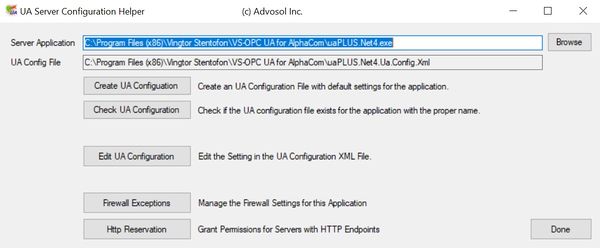
Push the “Create UA Configuration”-button.
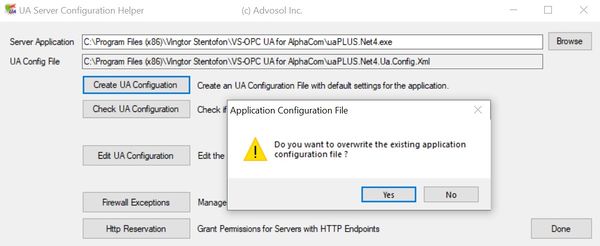
Push the “Yes”-button.
Push the “Check UA Configuration”-button.
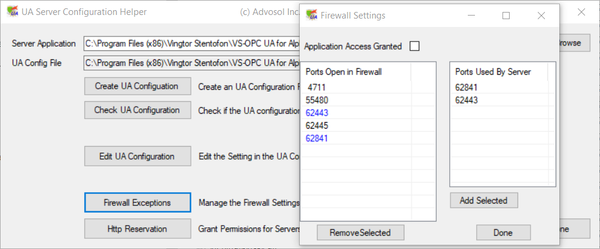
Push the “Firewall Exceptions”.
Check that port “62841/62443” are in the “Ports Open in Firewall” column.
Press “Done” when completed.
Press “Edit UA Configuration”.
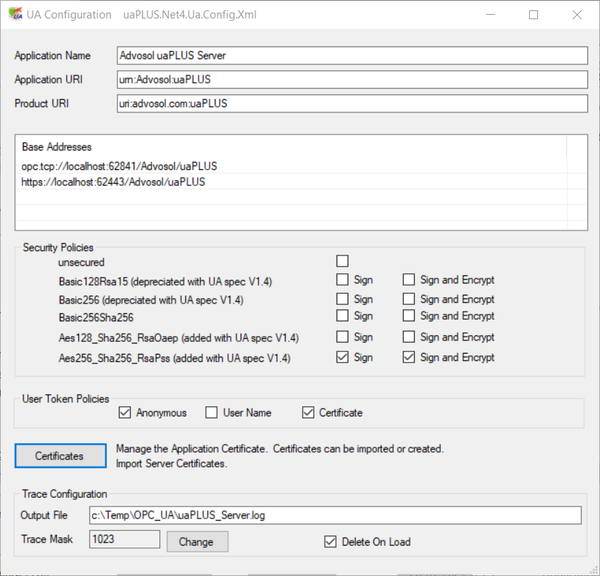
Set the “Security Policies” check marks as shown.
Select a log-file path and name.
Press the “Change”-button to enable logging levels
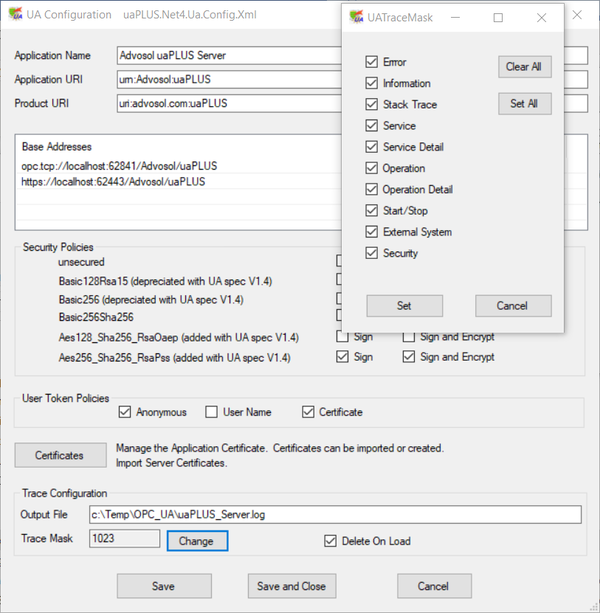
Press “Set All” and “Set” to complete this setting.
Press the “Certificates”-button.
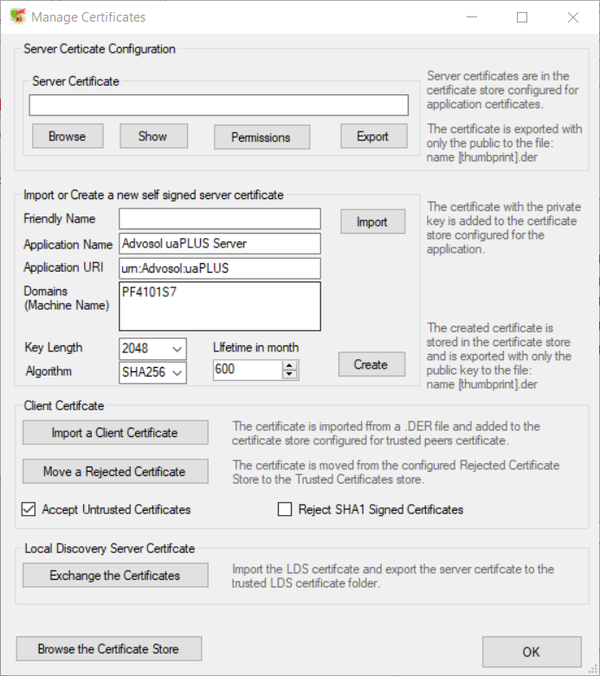
Press “Create”-button to create a new self signed server certificate.
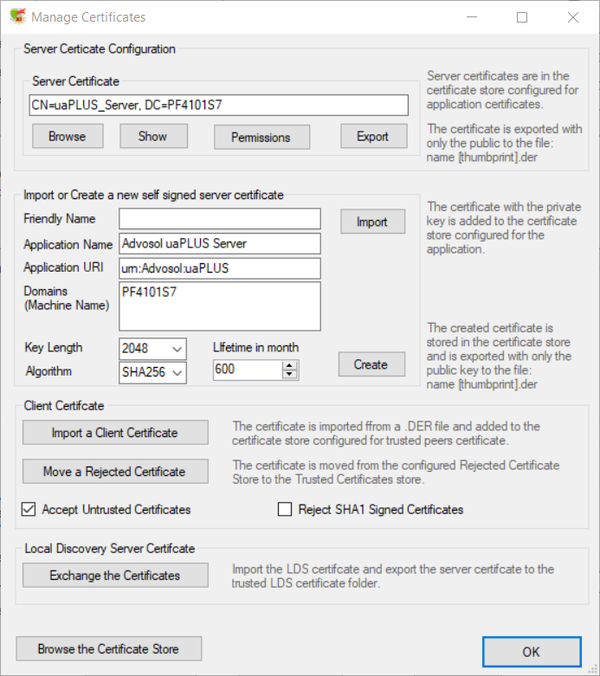
Close all windows by:
Press “OK”.
Press “Save and Close”.
Press “Done”.
Check that the server certificate is now store in “Trusted UA Applications/Certifcates” and “UA Applications/Certificates/” stores.
Make the OPC UA Server trust the LDS
On the MMC scroll down to “Trusted UA Applications/Certificates”.
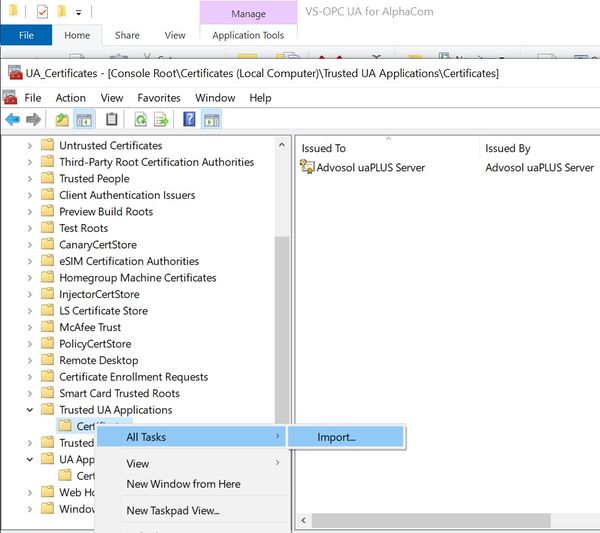
Right click on “Trusted UA Applications/Certificates” and select “All Tasks” and “Import”.
Browse to “C:\ProgramData\OPC Foundation\UA\pki\own\certs\” .
Select “All files”.
Select file “ualdcert.der”.
Press “Next”.
The “UA Local Discovery Server” is now a trusted application:
Make the LDS trust the OPC UA Server
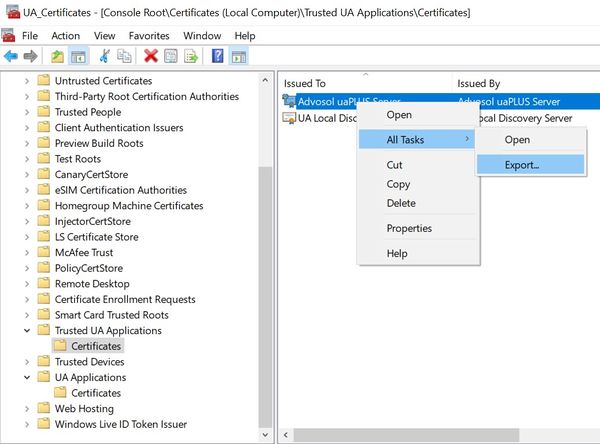
Locate the “Advosol uaPLUS Server” in the “Trusted UA Applications”.
Right click and select “All Tasks” and “Export”.
Browse to directory "C:\ProgramData\OPC Foundation\UA\pki\trusted\certs" and enter file name: “Advosol uaPlus Server”.
Press “Save” (If the certificate is already stored from a previous installation just press “Yes” to the question of overwrite).
Copy the OPC UA Server certificate from the directory
“C:\Program Files (x86)\Vingtor Stentofon\VS-OPC UA for AlphaCom” to the same directory of the client machine
Create and Configure Certifcate for the DA3TestClientUaNet4 test Client
The certificate for the test client DA3TestClientUaNet4 is created and configured by the means of the configuration utility UaClientConfigHelperNet4
![]()
![]()
Drag the icon for DA3TestClientUaNet4 over the UaClientConfigHelperNet4.
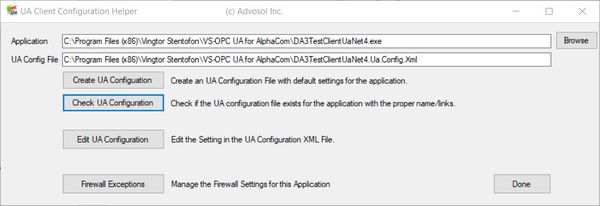
Press “Check UA Configuration”.
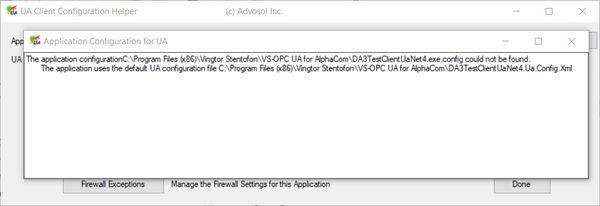
Close pressing “X” in upper right corner.
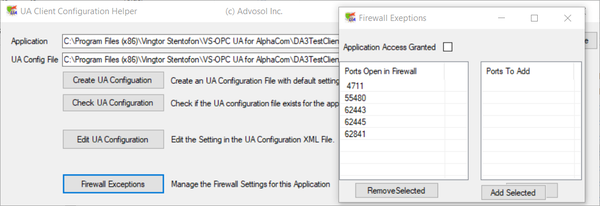
Check that port “62841” is listed in the column “Ports Open in Firewall”.
Press “X” in upper right corner.
Press “Edit UA Configuration”.
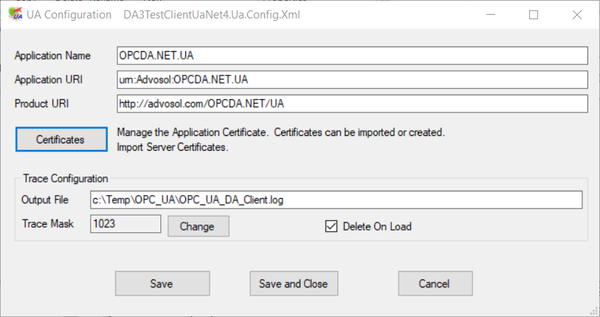
Edit “Output File” for appropriate path and file name.
Press “Change” and set logging level.
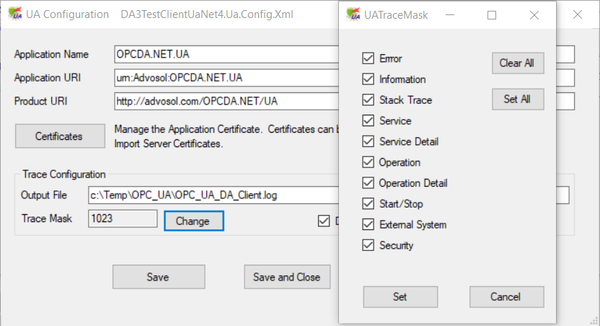
Press “Set All”.
Press “Set”.
Press “Certificates”.
Press “Create” in the “Create a new self signed certificate”-pane.
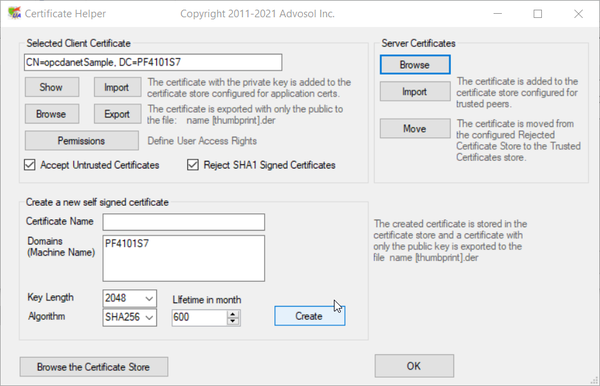
The server certificate from the server machine “C:\Program Files (x86)\Vingtor Stentofon\VS-OPC UA for AlphaCom” is supposed to be copied to the same directory of the client machine.
To make the client trust the server - in the “Server Certificates” press “Import” and select the Server certificate and press “Open”.
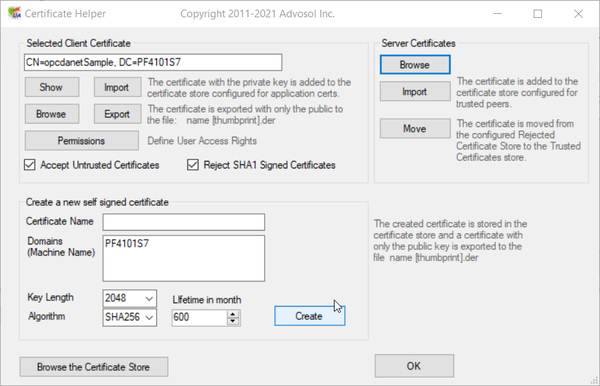
Close all windows by:
Press “OK”
Press “Save and Close”
Press “Done”.
Create and Configure Certificate for the AE-UATestClientUaNet4 Client
The certificate for the test client DA3TestClientUaNet4 is created and configured by the means of the configuration utility UaClientConfigHelperNet4.
![]()
![]()
Drag the application of the test client AE-UATestClientNet4.exe over configuration utility UaClientConfigHelperNet4.exe
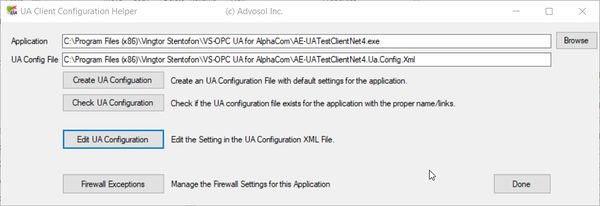
The creation and configuration is carried out as for the DA3TestClientUaNet4 test client with one exception.
Press “Edit UA Configuration”.
Change all “DA” to “AE”

Insert log output file name.
Push the Trace Mask “Change”-button
Select “Set all”.
Push “Set”-button.
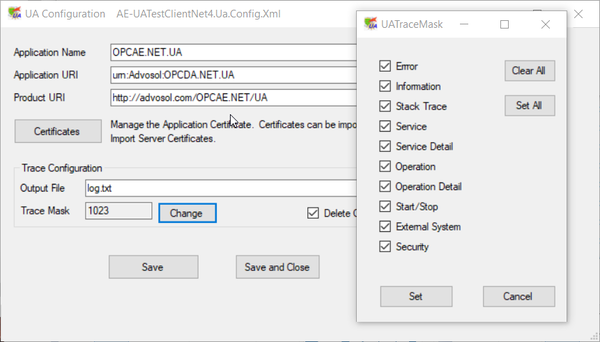
Push the “Certificates”-button.
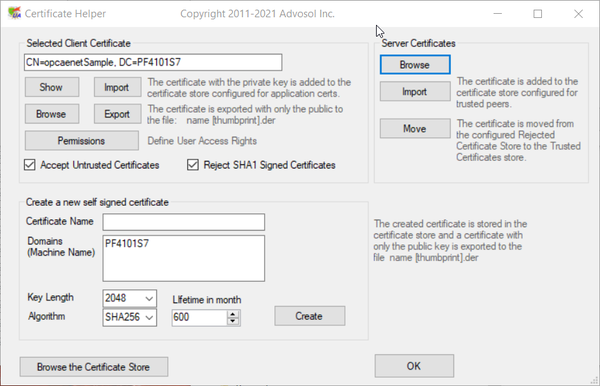
In the “Server Certificates” push the “Import” button and select the server certificate.
Press the “Open” button.
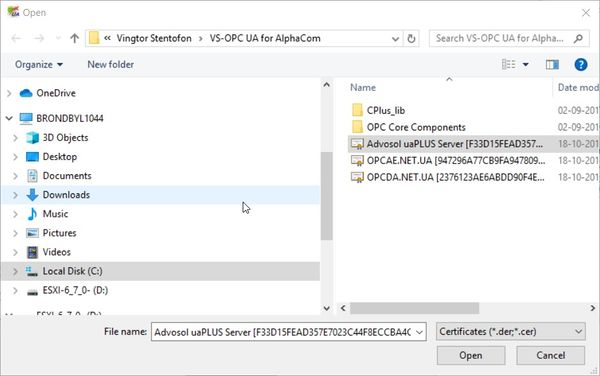
Close all windows by:
Push the “OK” button.
Push the “Save and Close” button.
Push the “Done”-button.
The client machine certificate store should now look as:
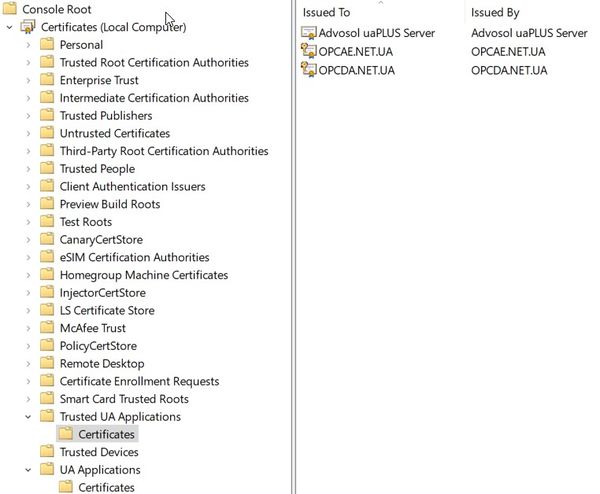
Copy the OPC UA test client certificates from the directory
“C:\Program Files (x86)\Vingtor Stentofon\VS-OPC UA for AlphaCom” to the same directory of the server machine
Make the Server trust the Client
Drag the server “uaPLUS.Net4” onto the configuration utility “UaServerConfigHelperNet4”.
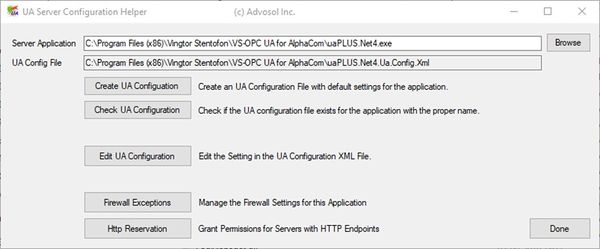
Push the “Edit UA Configuration”-button.
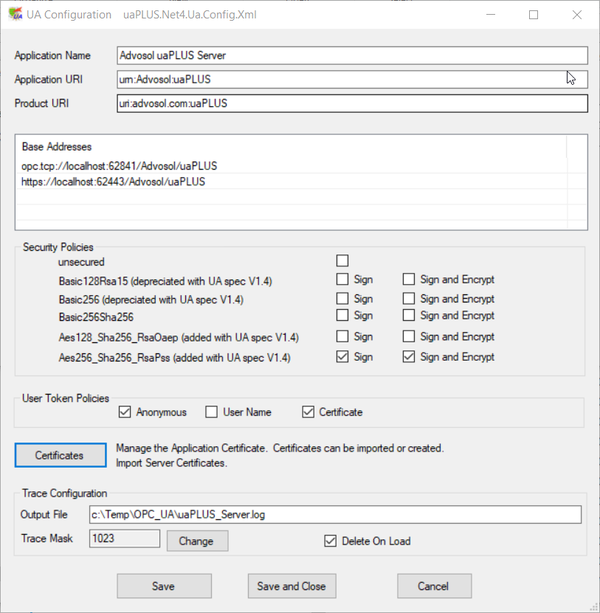
Push the “Certificates”-button.
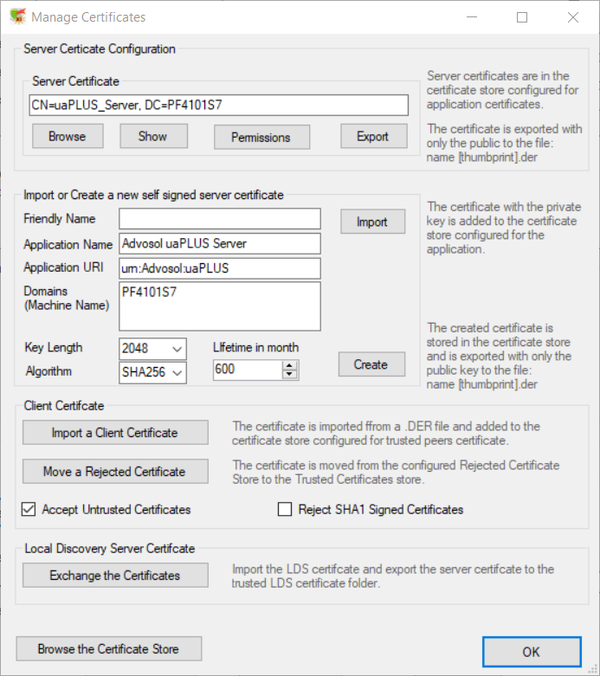
In the “Client Certificates” push the “Import a Client Certificate”-button and select the OPCAE.NET.UA test client.
Push the “Open”-button.

Again, in the “Client Certificates” push the “Import a Client Certificate”-button and select the OPCDA.NET.UA test client.
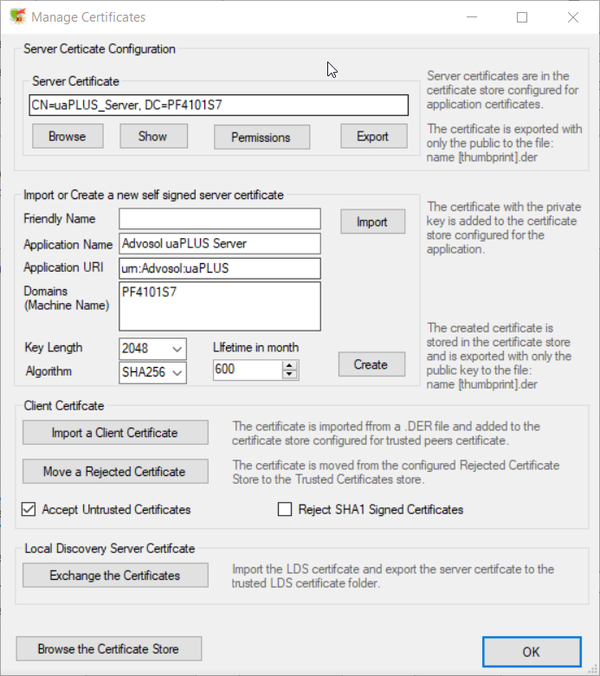
Close all windows by:
Pushing the “OK”-button
Pushing the “Save and Close”-button.
Pushing the “Done”-button.
Check “Trusted UA Applications”
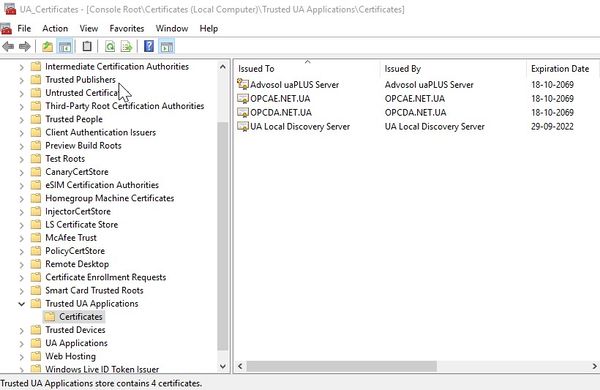
Startup of Server / Client Connection
Setup the OPC Server using the OPC Server Configurator tool.
Follow the details here; OPC Classic for AlphaCom - Installation - Zenitel Wiki
Start the server uaPLUS.Net4 and copy the Endpoint URL
Start the OPCDA.NET-UA test client.
In the Browse Server box, type ua: then paste the server URL and press Connect
After connection push “Browse Items” and the list of OPC Data points should populate.
Start the OPCAE.NET-UA test client.
Enter the same Server URL and push “Connect”.
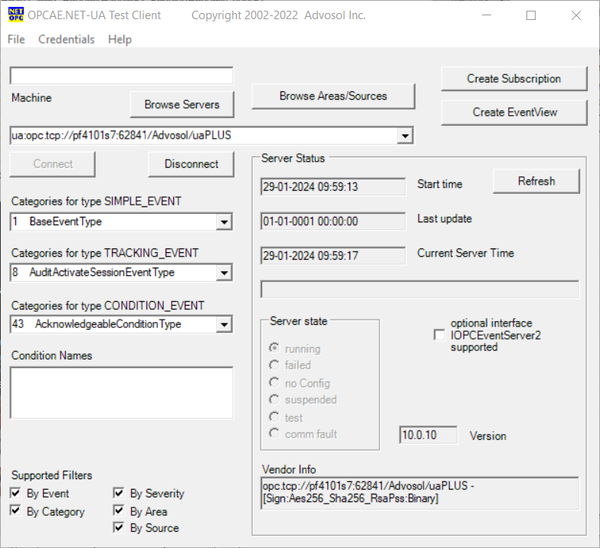
The server shows the two client connections:
Installing the service
In File explorer, navigate to the installation directory C:\Program Files (x86)\Vingtor Stentofon\VS-OPC UA for AlphaCom
Go to File/Open Windows Powershell/Open Windows Powershell as administrator
Enter .\Install_AlphaCom_OPC.bat and press <Enter>
Edit the configuration file uaPLUS.Net4.Ua.Config.Xml and remove the Thumbprint line of the SecurityConfiguration section - otherwise the service cannot start.
Before starting any clients make certain that the AlphaCom_OPC server is running and that the Startup Type has been set to Automatic
AlphaNetServiceProvider
The OPCServerConfigurator utility tool makes it possible to configure whether the OPC-Server is directly or remotely connected to the AlphaCom.
In case the OPC-Server connection to the AlphaCom is configured as a direct connection, the AlphaCom IP-address is specified and which of the two port (61112 or 61113) that should be used.
In case the OPC-Server connection to the AlphaCom is configured as a remote connection, the IP-address of the service provider is specified and which port that should be used. This service provider is name AlphaNetServiceProvider and is currently available in the VS-SDK for AlphaCom installation package. The AlphaNetServiceProvider is also available as a service, which can be installed via the package AlphaNetServiceProviderService_Setup. Configuration of the service is done via the AlphaNetServiceProvider GUI.
Please find the documentation of the AlphaNetServiceProvider at AlphaWiki.



